All updates compiled in one place:
1066-1071: Consolidation
1071-1078: Preparations
1078-1082: Jihad
1082-1086: Murder
1086-1094: Sultanate
A note on historical accuracy: Some of the details I mention like the rivalry between my main character and the sheikh of Syracuse are not part of CK3 proper, but gleaned from this wikipedia article https://en.wikipedia.org/wiki/Battle_of_Cerami. and other wikipedia articles about Muslim Sicily in this time period (yeah I know Wikipedia isn't the best source but this is an AAR not academia) I don't think CK3 is very accurate to what the actual situation was like in Muslim Sicily in 1066 which fair enough, they'd be conquered by the Normans in 30 years anyways and I think I might be the only one who cares about them vs everybody who cares about Robert the Fox.
I noticed there's a dearth of AARs with Islamic rulers/ dynasties, so I figured I'd do one.
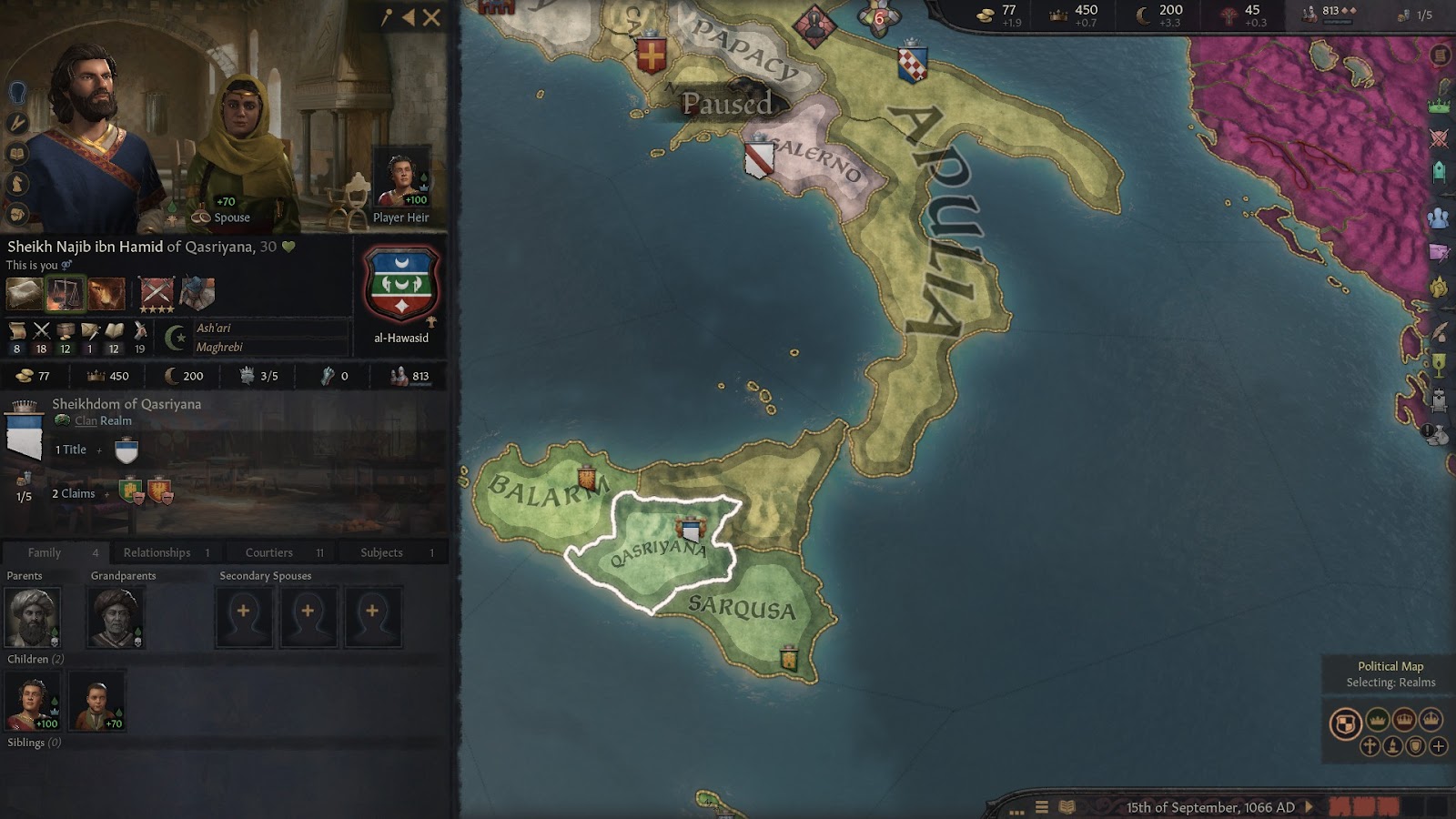
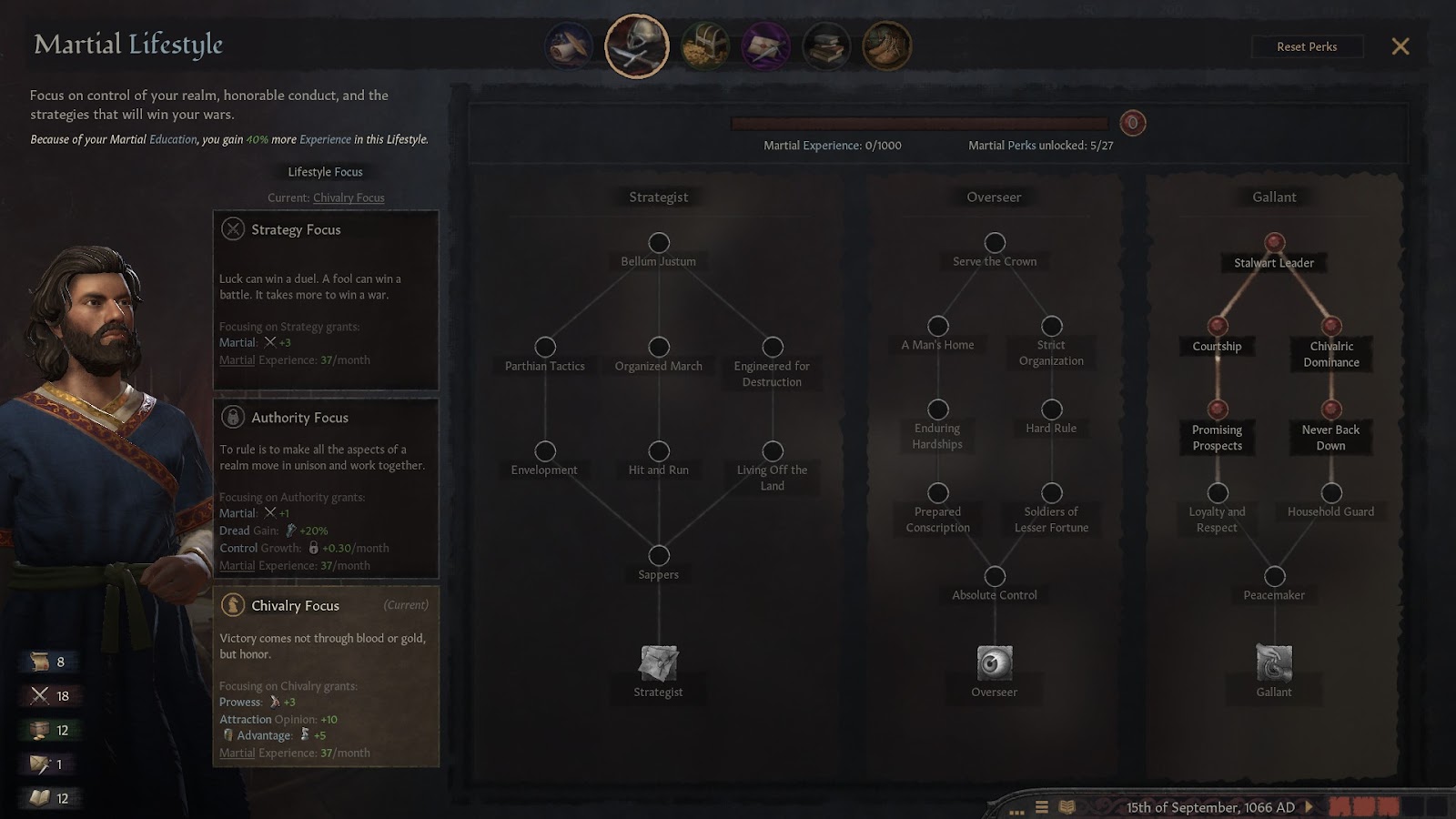
The year is 1066, and things are not going well for the Muslims of Sicily. The island had been rife with factional conflict since 1010's between various pro-Zirid and pro-Byzantine factions, with the Kalbid and thus Fatimid hold on the island slipping away almost entirely. By the time the final Kalbid governor died in 1053, the island was hopelessly divided with the Zirids holding sway in the traditional capital of Balarm but not much else outside of it. 5 years prior, the Normans took Messina, heralded by the traitorous Greek Orthodox as liberators and had frustrated efforts to dislodge them by winning a stunning victory at the battle of Cerami in 1063 over a combined Zirid-Sicilian force (predominantly made of soldiers from Balarm but the ruler of the stronghold of Enna and some other figures from central Sicily were also cooperating) which spelled the end of any hope of the Zirids managing to control much more than Balarm as the native Sicilian blamed and resented them for the loss, and ended any hopes the Normans could rapidly be expelled from Messina. The Normans had been prevented on following up on that victory only by an outbreak of rebellion in Roger's Calabrian holdings, but it was only a matter of time before the Normans came to take the rest of Sicily, promised to them by the Pope. If Muslim Sicily had any hope of surviving, it needed a miracle. Instead what it got was Najib ibn Hamid, a brilliant strategist, an average steward and learned man and a terrible diplomat and schemer.
A profoundly lazy man, he would have preferred it if someone else could do the work of uniting Sicily, however, Syracuse was ruled by his rival who had entreated the Normans for aid and promised to recognize their claim over Sicily to destroy his uncle's aim of uniting the island, and the emir in Balarm was nothing more than a puppet of the Zirids, whose incompetence and cowardice was on full display at Cerami where they abandoned the brave men of Balarm to the enemy. No, it would have to be him.
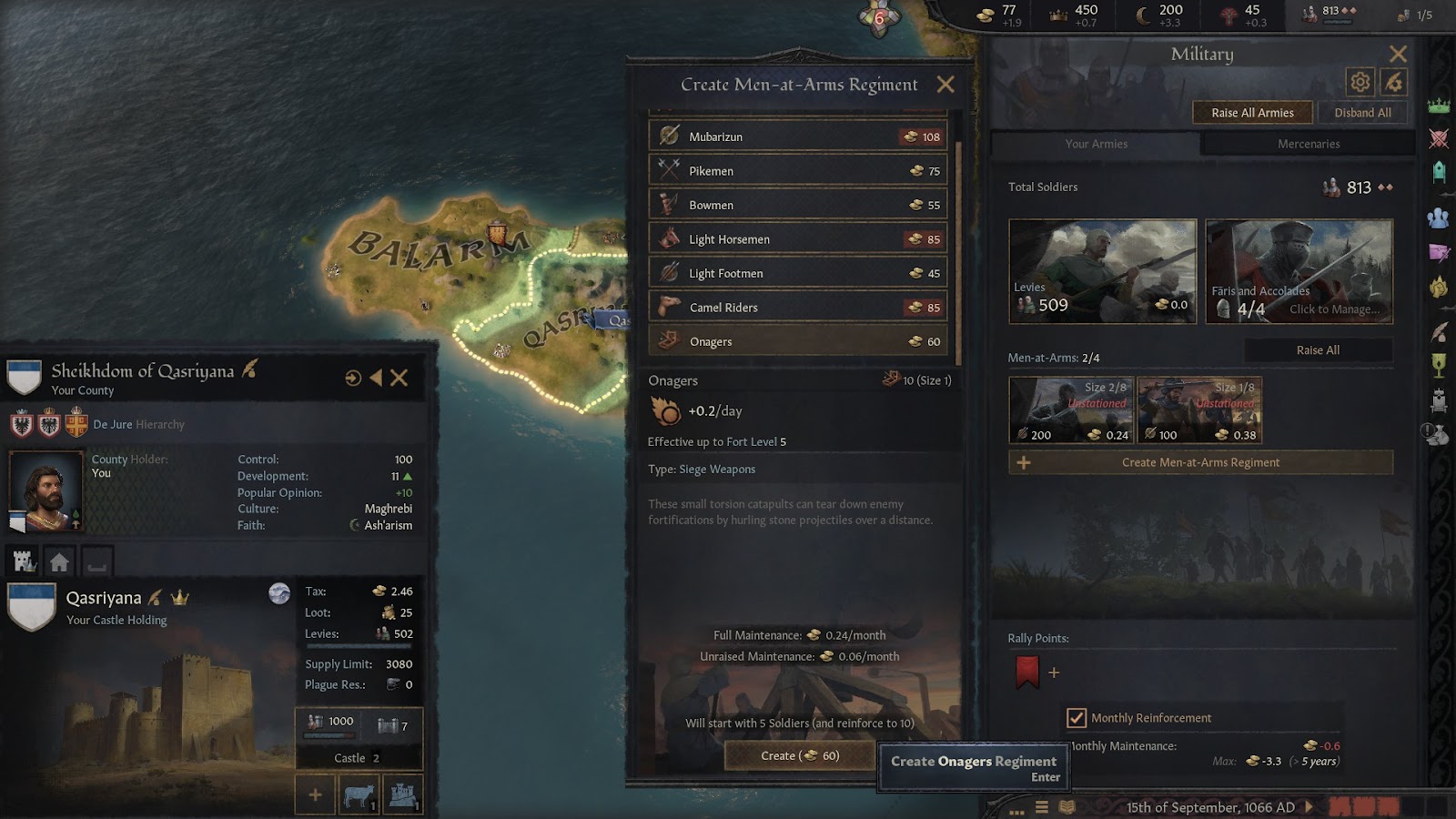
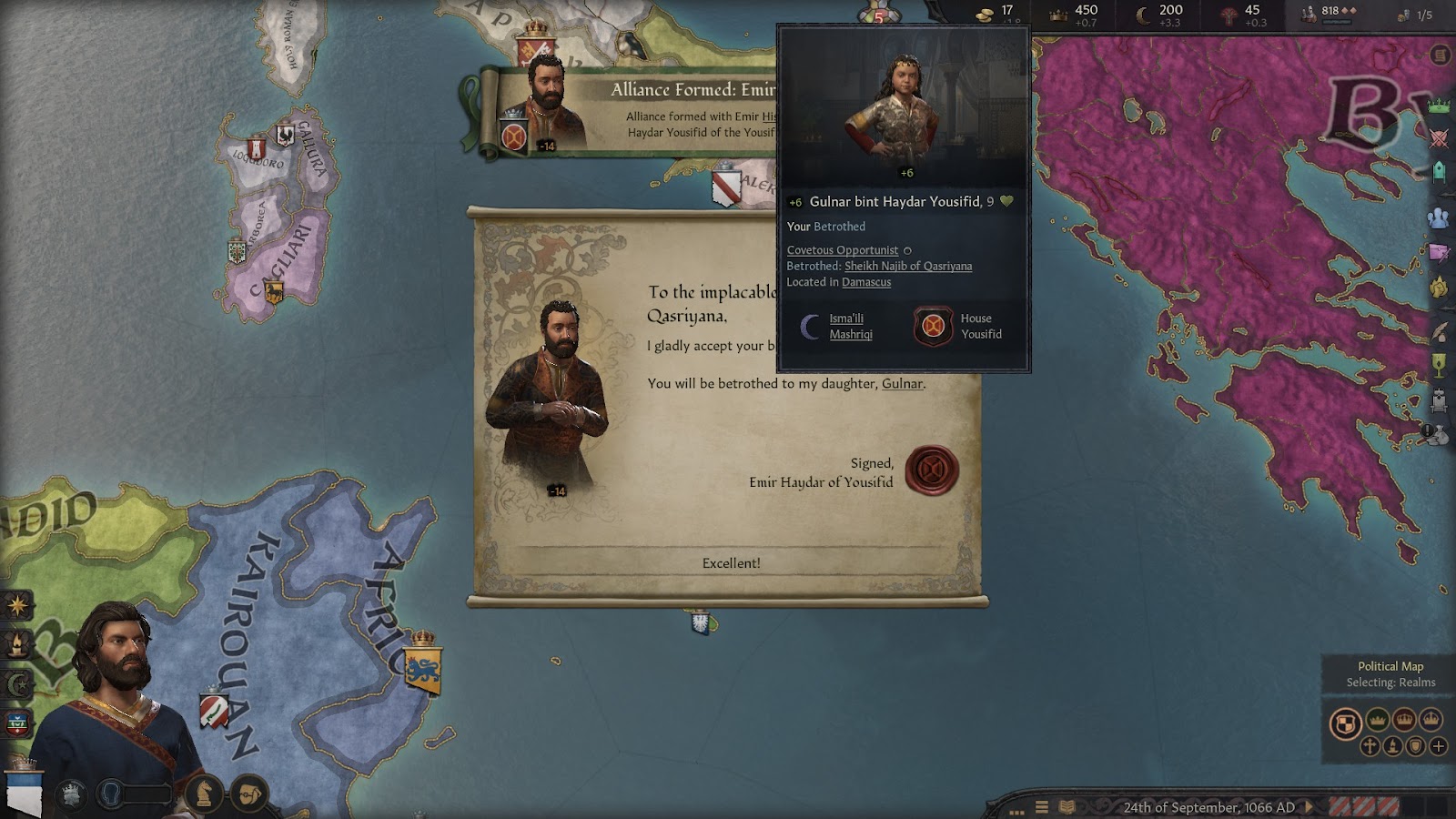
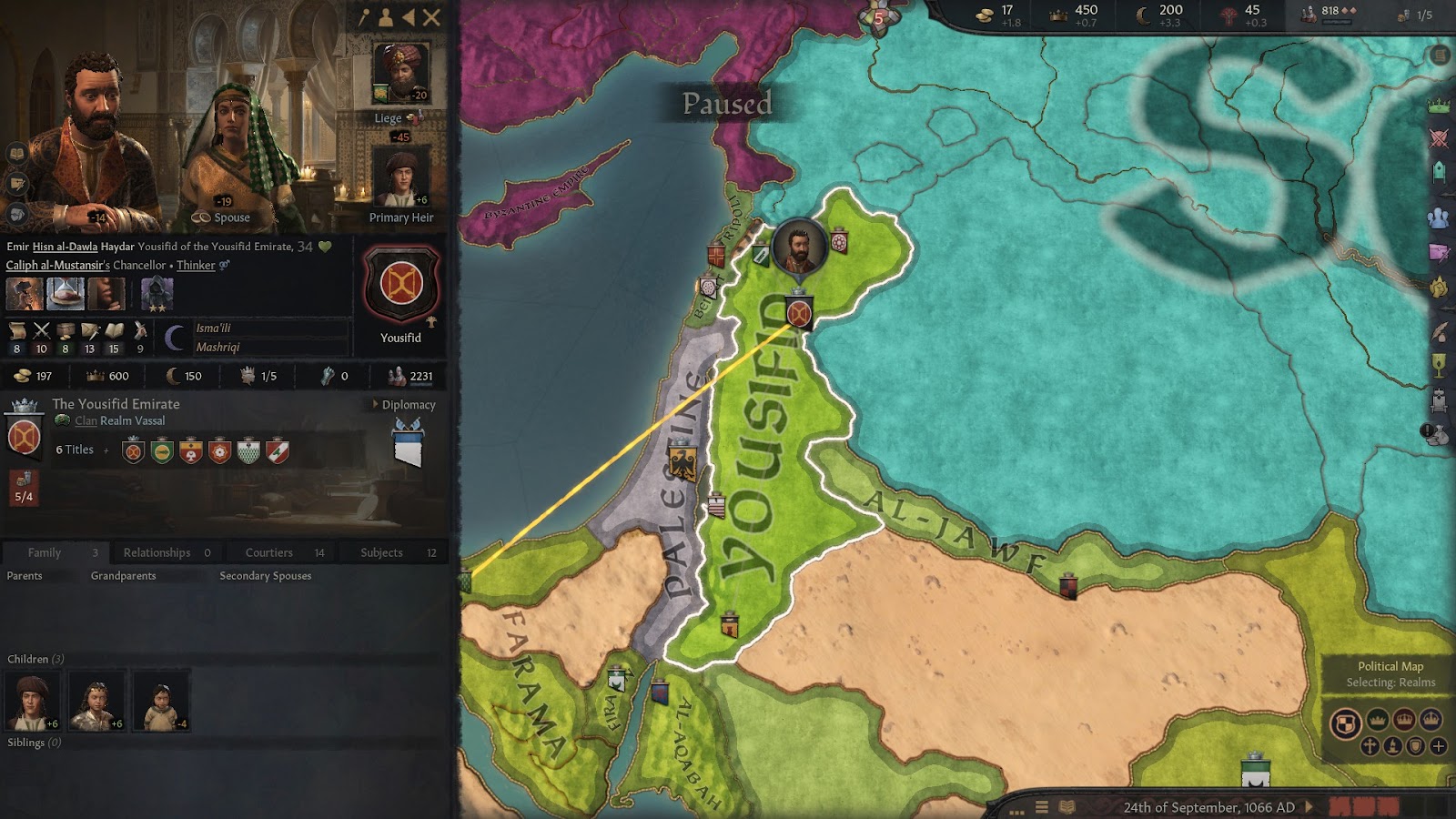
Recognizing the futility of attempting sieges of any kind without siege equipment, he immediately set out to building onagers. However, uniting Sicily alone would not be enough, with larger hostile christian powers right on the doorstep, ties with the Fatimids or another Islamic power needed to be reestablished, the first step towards which was the offer of betrothal Najib made with the daughter of the Yousofid Emir. The Fatimids were a Shia Caliphate, and Ibn Hamid was Sunni, however such differences were more flexible than they seemed when the situation was desperate enough. Najib ordered the masjids to proclaim the Caliph al-Mustansir’s name during the Friday kutbah, which signalled his allegiance to the Fatimid caliph. A powerful lord who could boast over 2000 men, such an alliance would give Najib room to manuever as he took over the island, and legitimize him in the eyes of the Muslims of Sicily.
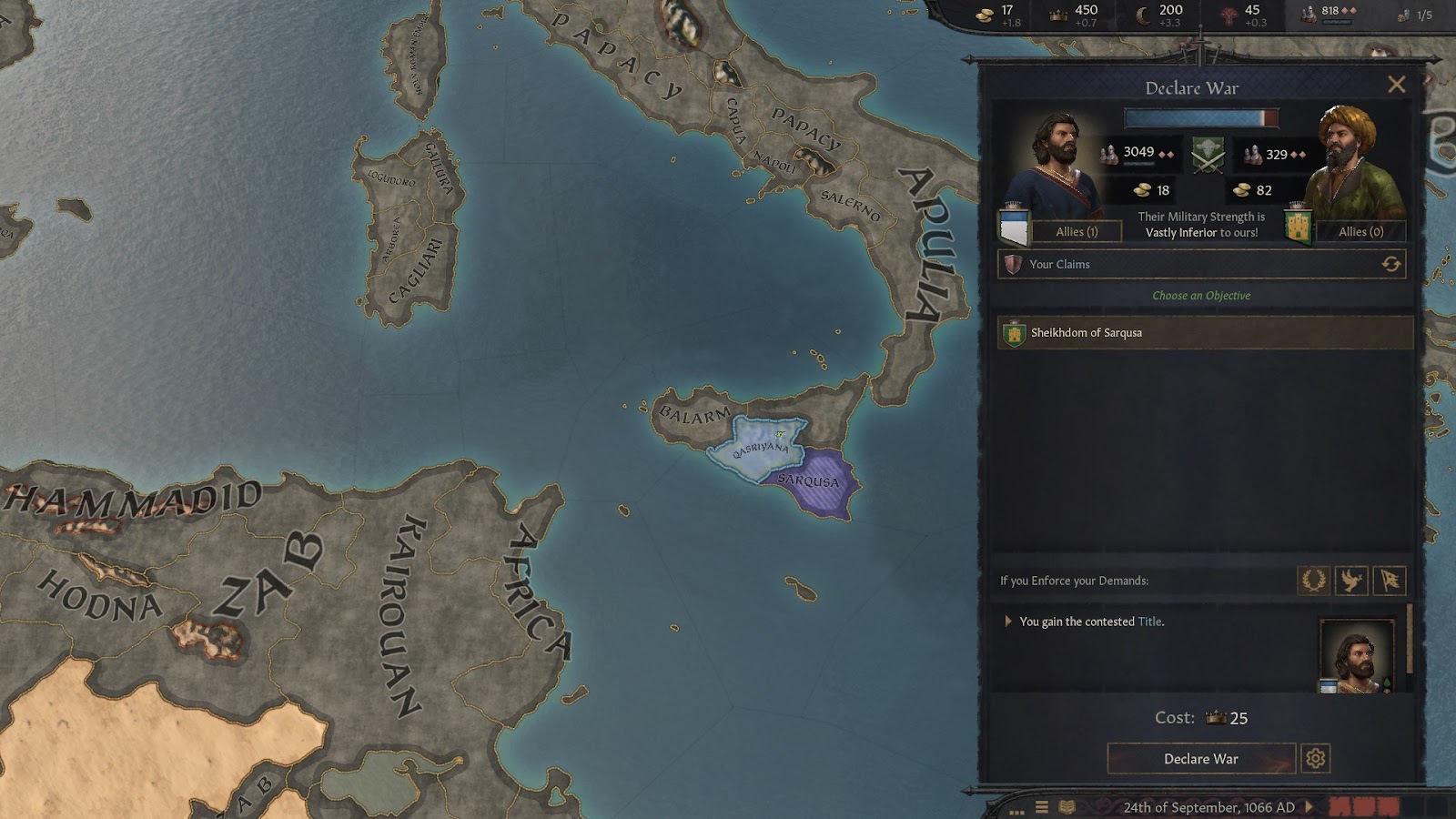
In November 24, 1066, Najib ibn Hamid marched against his hated rival, Sheikh Ali III, declaring him a traitor to the faith, and enforcing a claim to Syracuse as governor of Sicily restoring order and punishing traitors to the Caliph and the umma. This was a bold claim to make, the Fatimid Caliph had at this point not even acknowledged him and Sicily had traditionally been ruled by the Kalbids from Palermo, not from Qasriyana which was simply where the strongest garrison was. However, the shakiness of this claim belied a simple fact - the military had historically been one of the most important political players in the island, and the bulk of it, especially those situated in the fortress of Enna which dominated the center of the island, wanted Hamid to govern the island. He was a respected commander who had participated in many battles against the Normans and proved his capabilities and they would follow him to hell. In 1066, Najib had 818 men while his rivals in Syracuse and Palermo together could only command 975. Further his uncle had briefly controlled Syracuse from 1060-1062 (hence the need for Ali III to go running to Robert, Nijab's uncle was close to uniting Sicily)
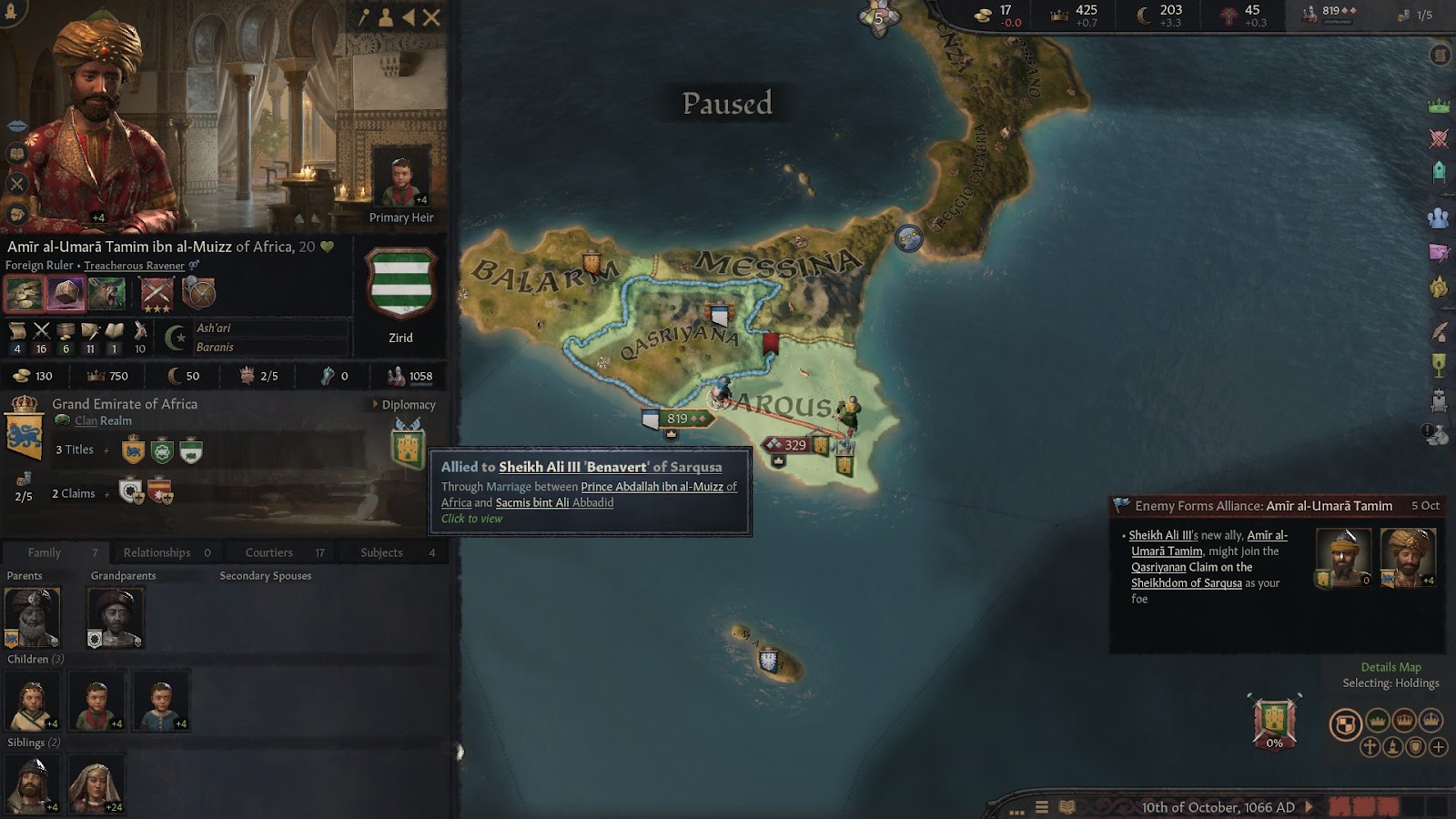
As he marched on Syracuse, Najib received terrible news - the Zirids had allied his rival! The snake, not content with inviting the Normans in to deal with him had pledged himself to the Zirids as well and even married his daughter to the Amir. Najib was not impressed however, the Zirids had proven themselves incapable at Cerami, he was confident he could take them. But it was even more likely that the war would be over before the Zirids could meaningfully be involved
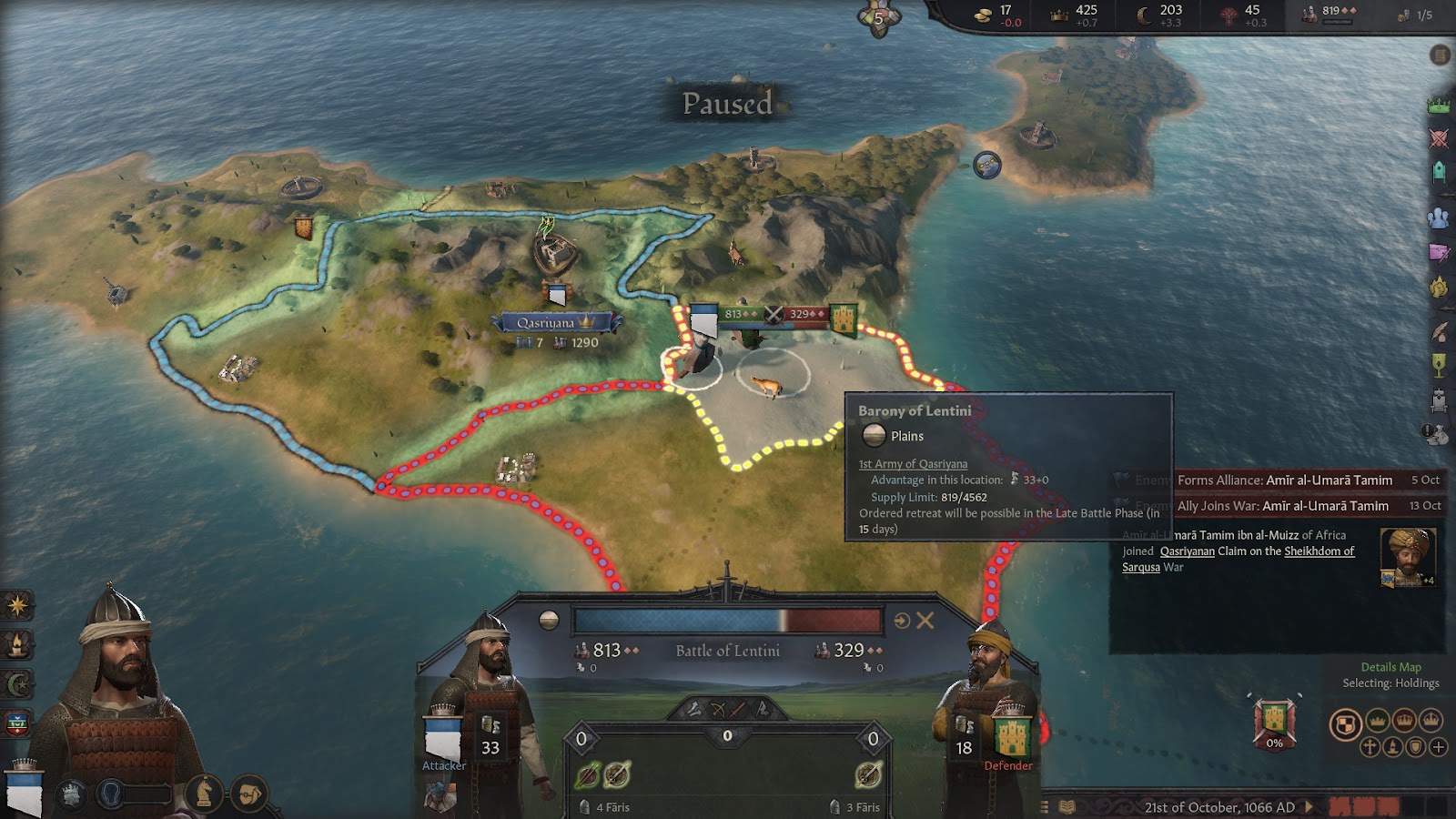
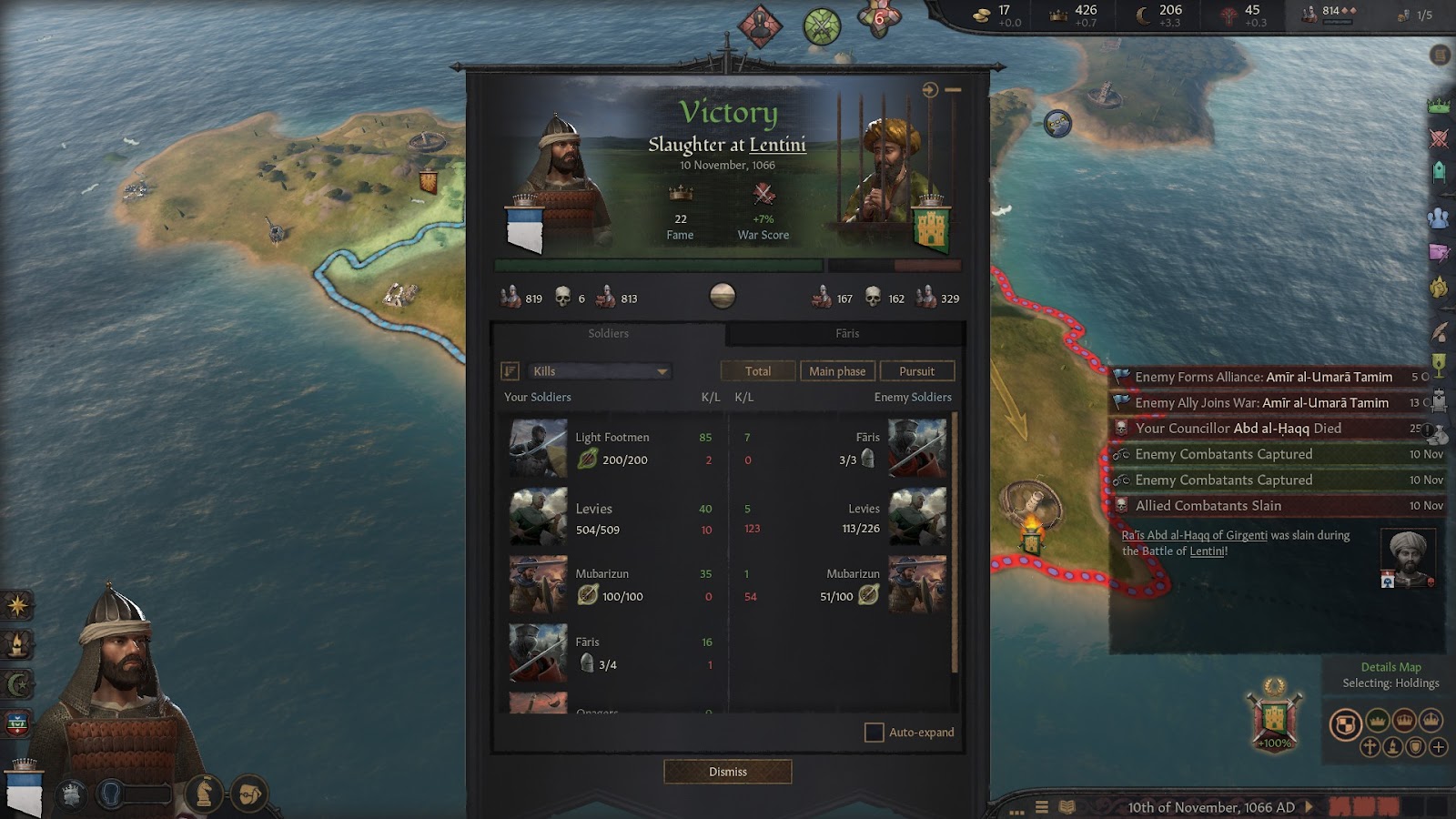
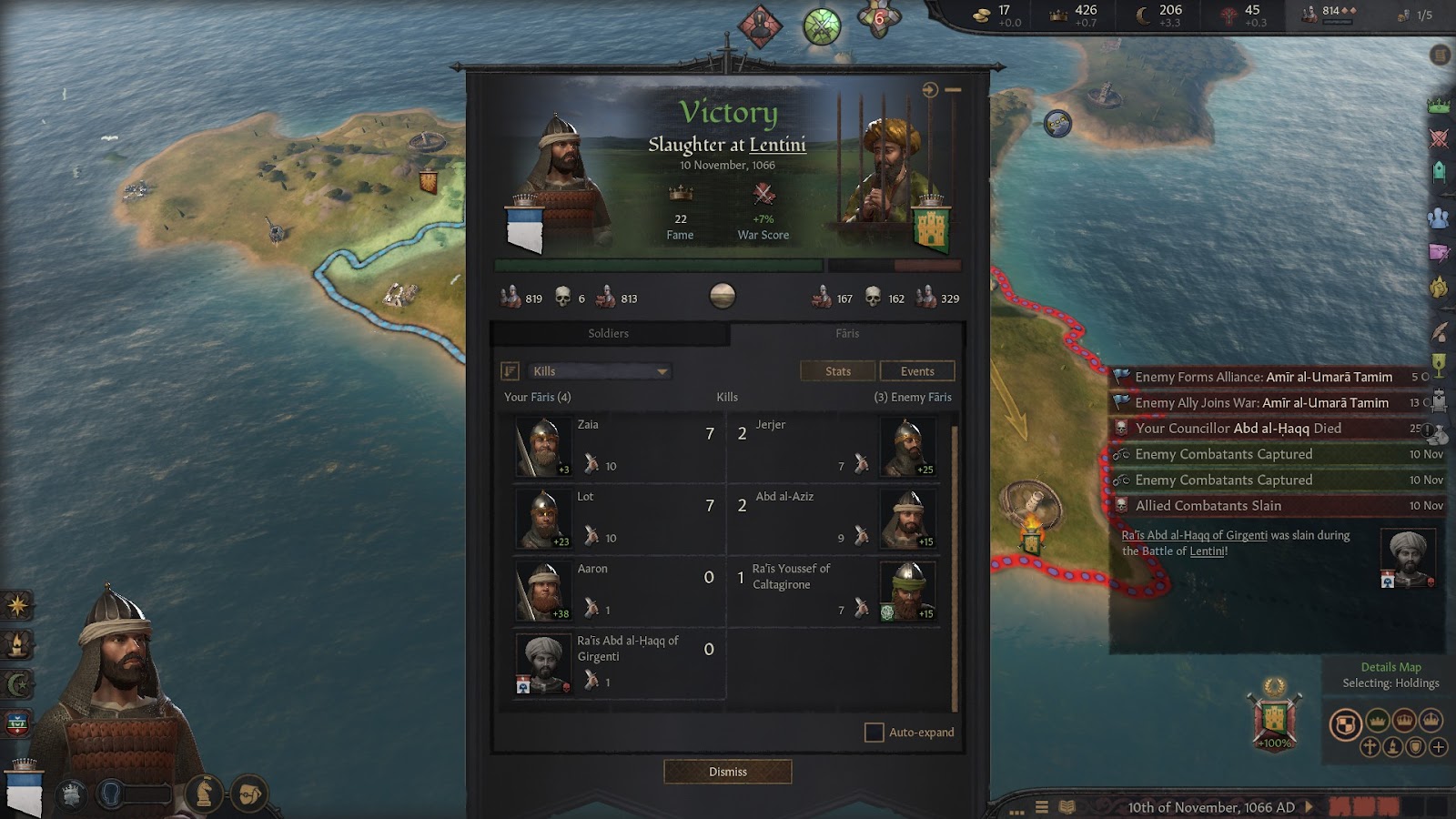
In October 21, 1066, Najib ibn Hamid’s forces met Ali III on the plains of Lentini. The battle was a slaughter for Ali’s forces, half of them were wiped out. The victory wasn’t totally without pain for Najib however, his spymaster and the mayor of Girgenti had died on the battlefield, his retinue wiped out to the last man. A calming influence on his liege he will be missed. Sheikh Ali was captured in the battle, but ransomed back for 50 gold, along with the mayor of Caltagirone (who was ransomed back for 28, not having the customary 30).
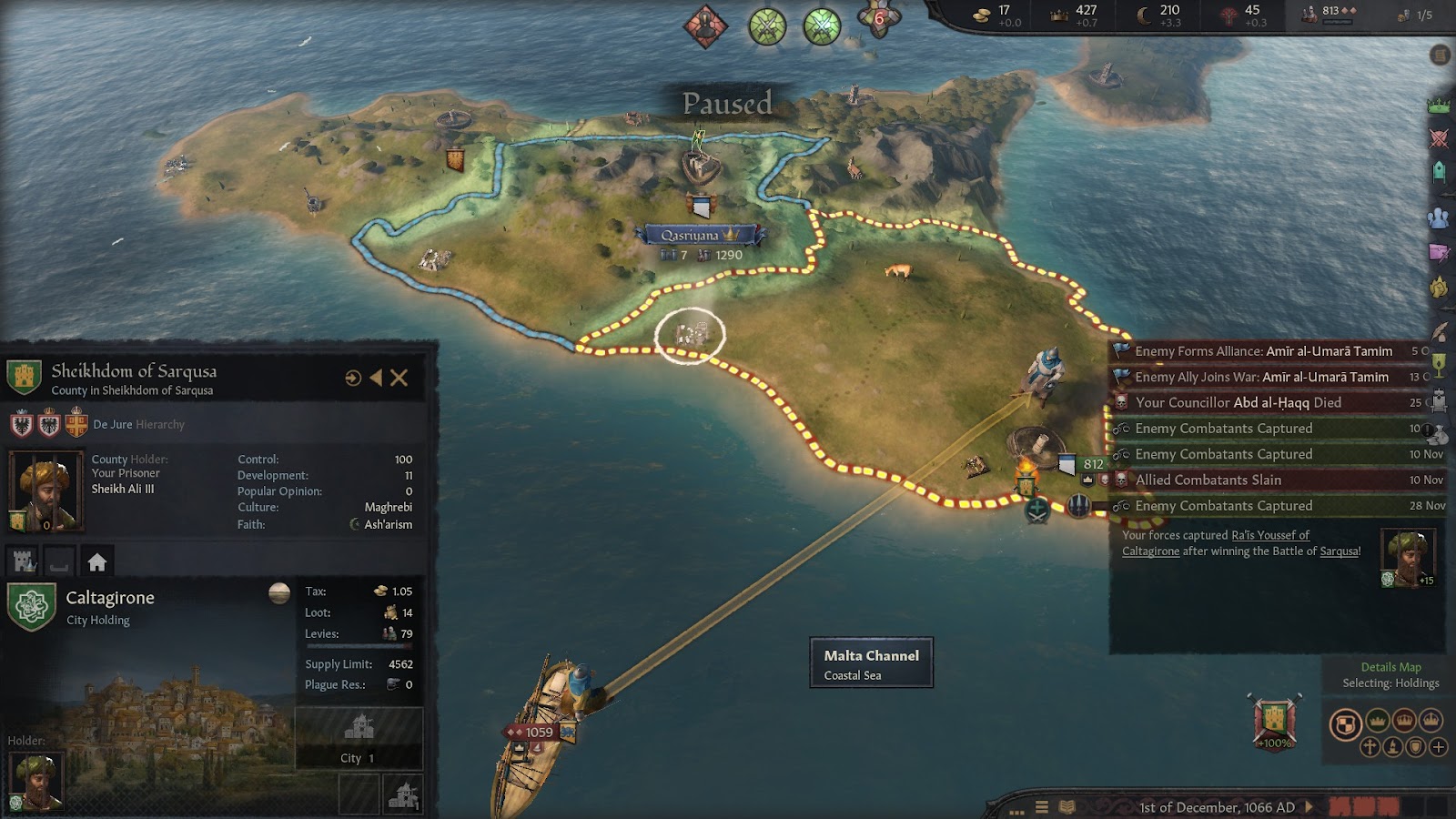
The Zirids came, and were slaughtered as they landed, the siege of Sarqusa continues, and a few minor battles later, (and one more ransom of Ali for gold), Sarqusa was captured and on January 18, 1068, Najib officially became recognized as sheikh of Syracuse. Ibn Hamid quickly secured oaths of loyalty from Sarqusa’s inhabitants and defenders, when another disaster struck. The Byzantines were making their move.
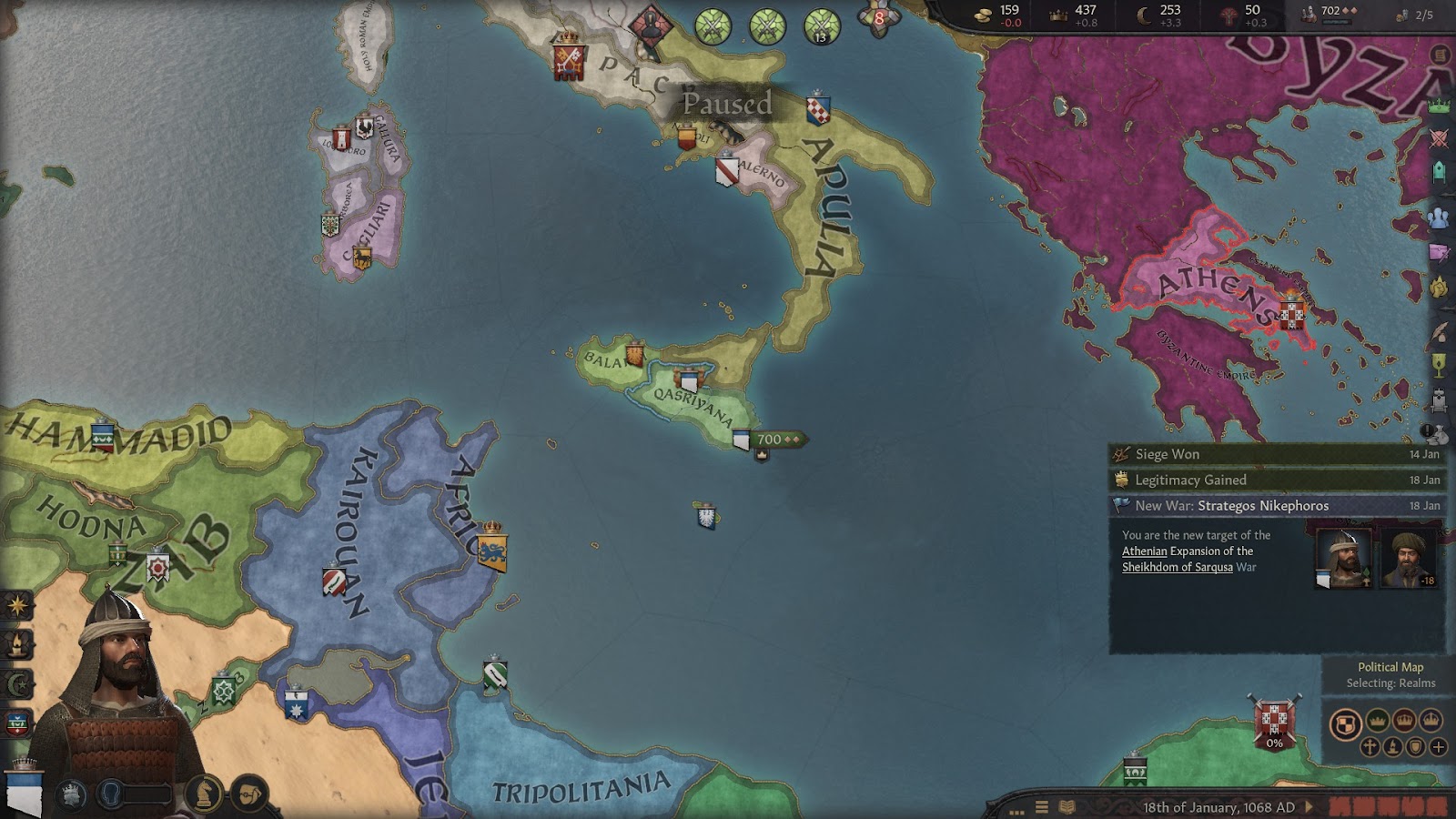
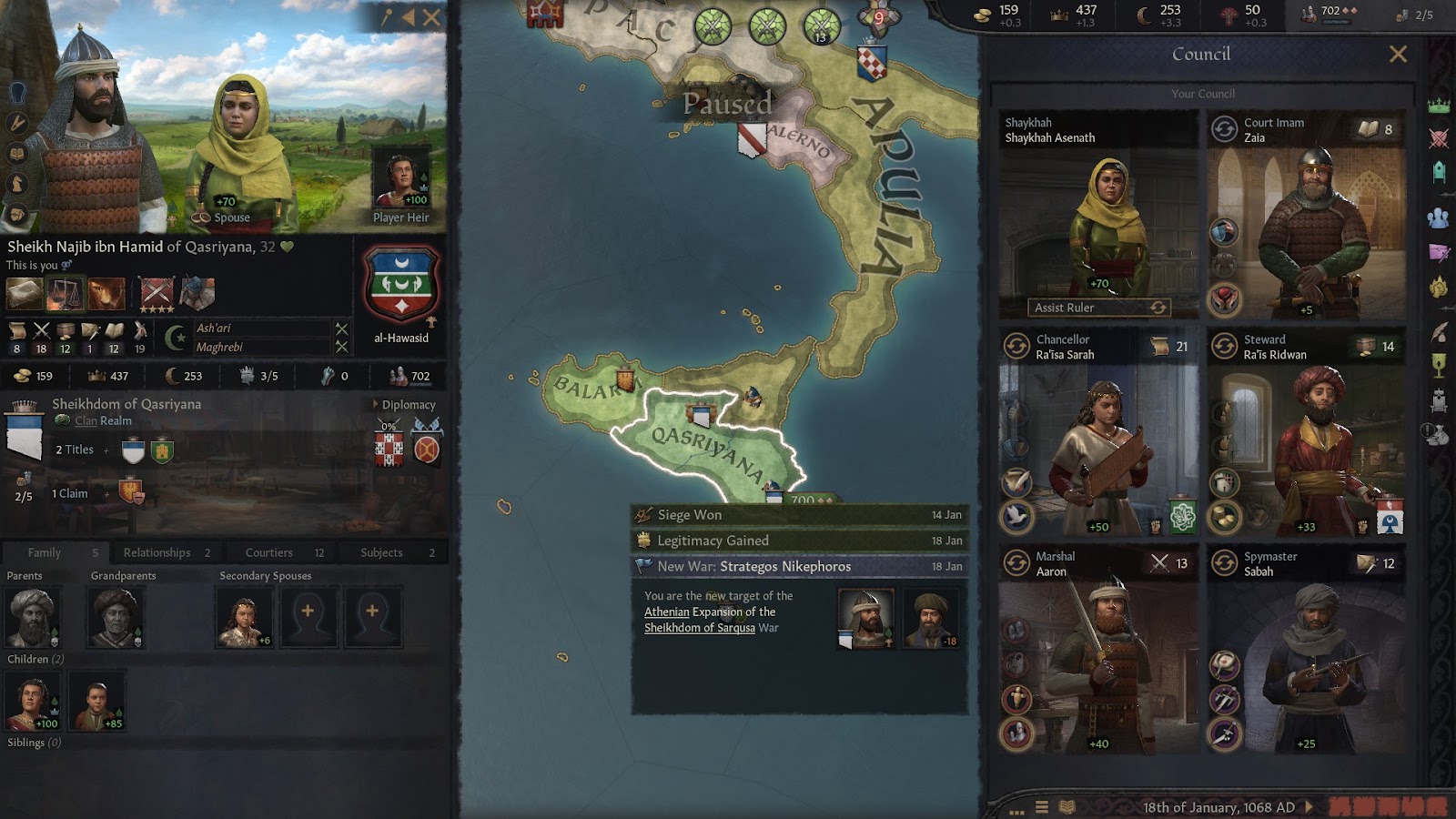
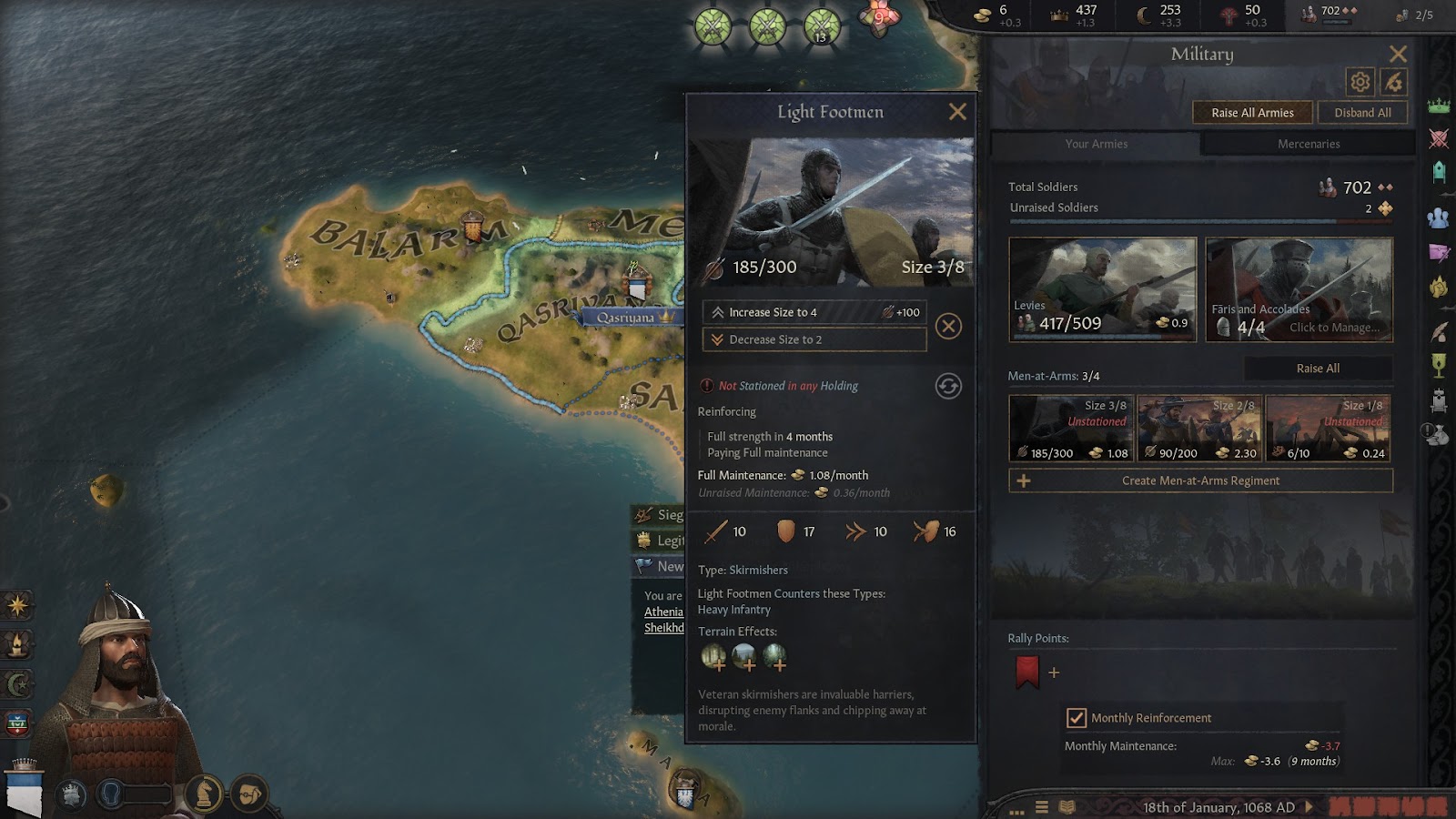
Seeing opportunity in the fighting, the strategos of Athens had declared war on Ali for Syracuse, and saw no need to change plans now that Ibn Hamid had been recognized as the ruler. The council was quickly reorganized to plug any holes that had formed during the war, Aaron the chancellor became the marshall and was quickly put to work organizing affairs in Syracuse. The mayor of the city of Calgirone was made chancellor to integrate Saraqusa into ibn Hamid's government, while the new mayor of Girgenti went to work as a steward.
Using the money earned from ransoming Ali, Najib ordered 100 Mubarizum and 100 light footmen raised for the war with the Byzantines. Now all that was left was to wait for them to come to him.
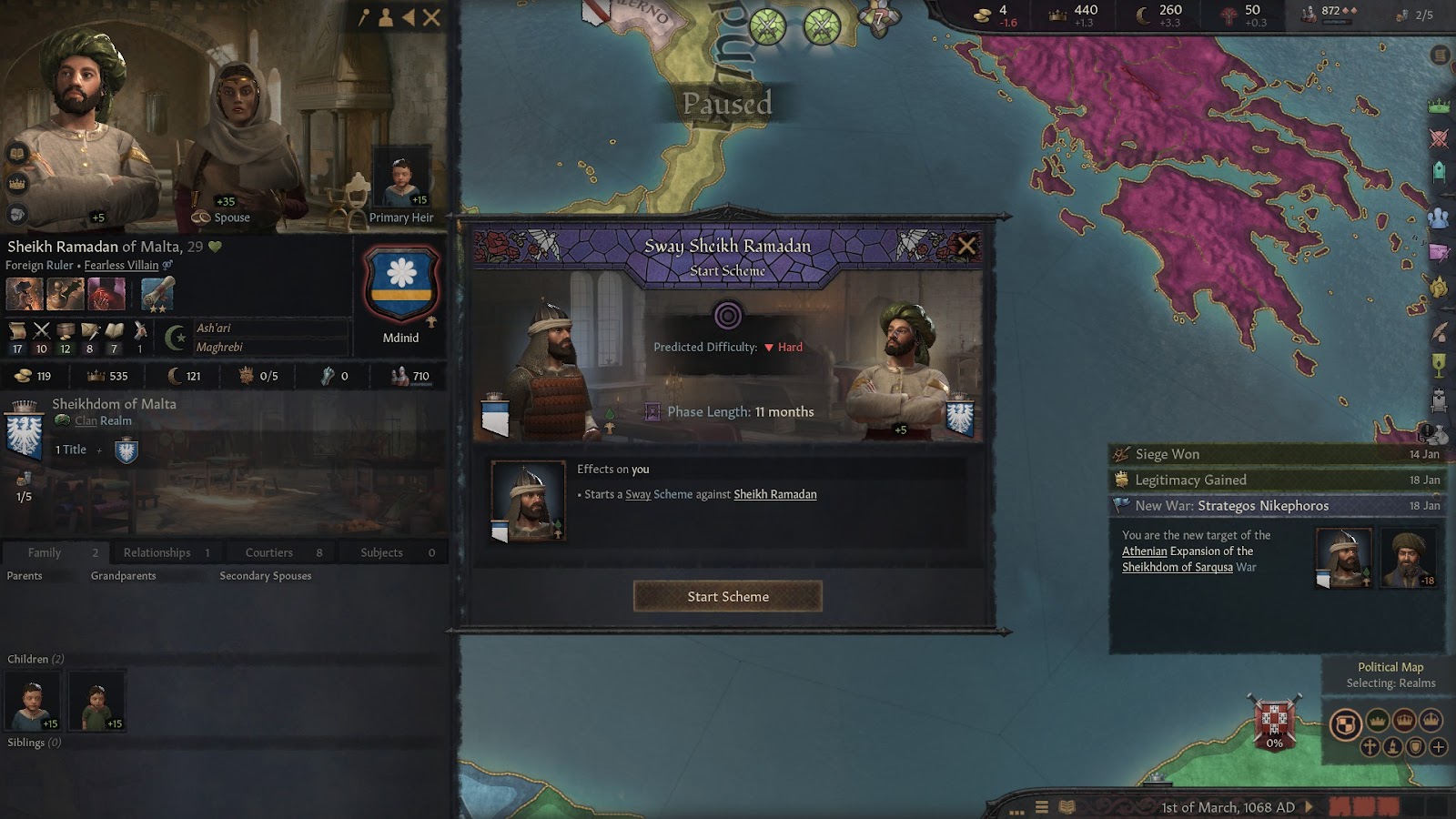
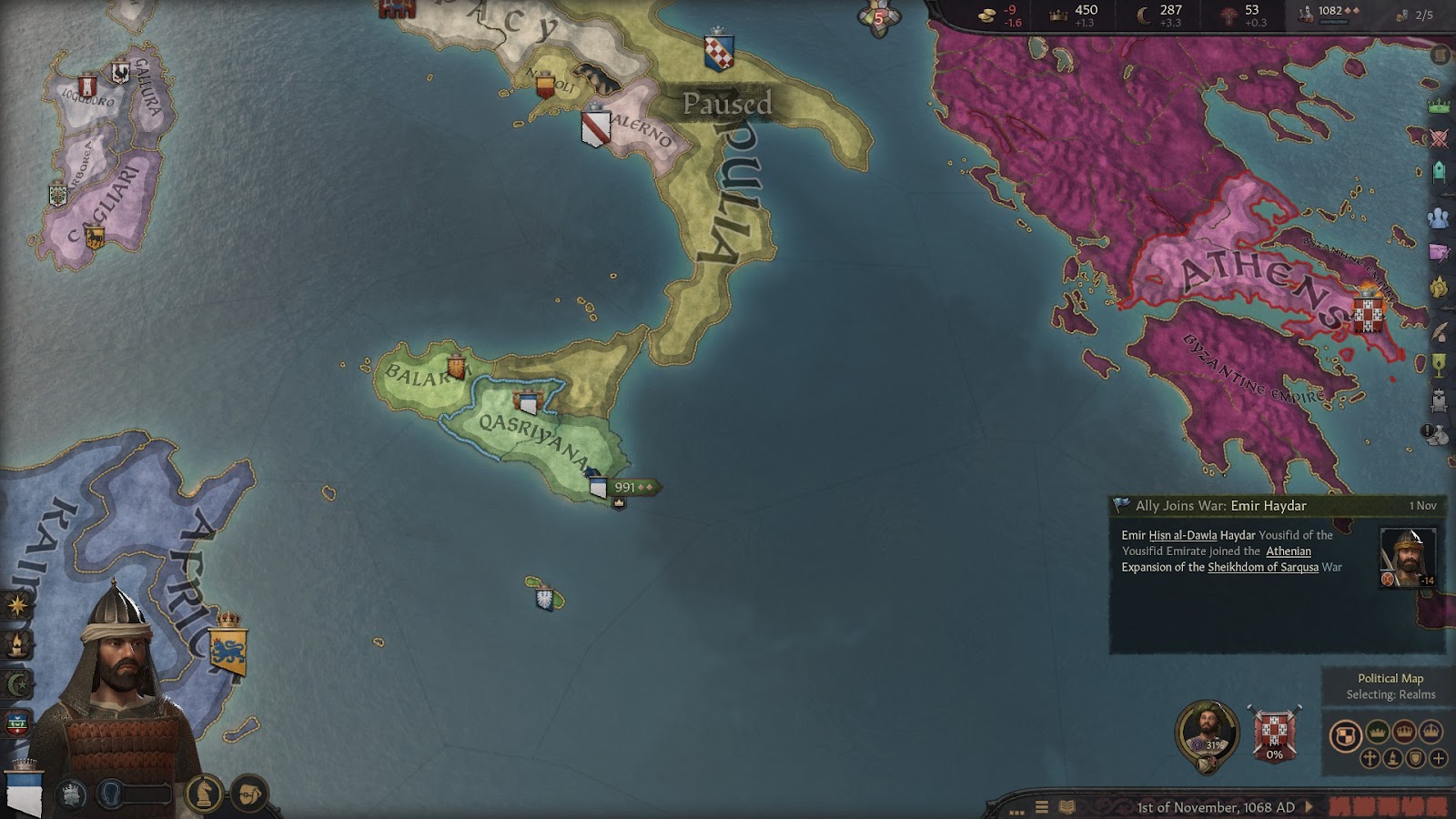
Najib’s policy towards the shaikh of Malta was much less hostile and confrontational than his towards the other rulers of Sicily. Unlike Balarm who was a puppet to the incompetent and cowardly Zirids, and unlike Ali who he hated on a personal level, he admired Sheikh Ramadan, and sought to impress upon him his qualifications for governorship. Whether Ramadan would be prepared to listen was another story. It must also be noted that a naval invasion of Malta would be a tall order for Najib, even with his increased resources. On November 1, 1068 Najib calls his allies to war, and they agree to honor the call. The strategos of Athens may not have many troops, but rumors abound they have hired a mercenary company, and Najib is slightly in debt.
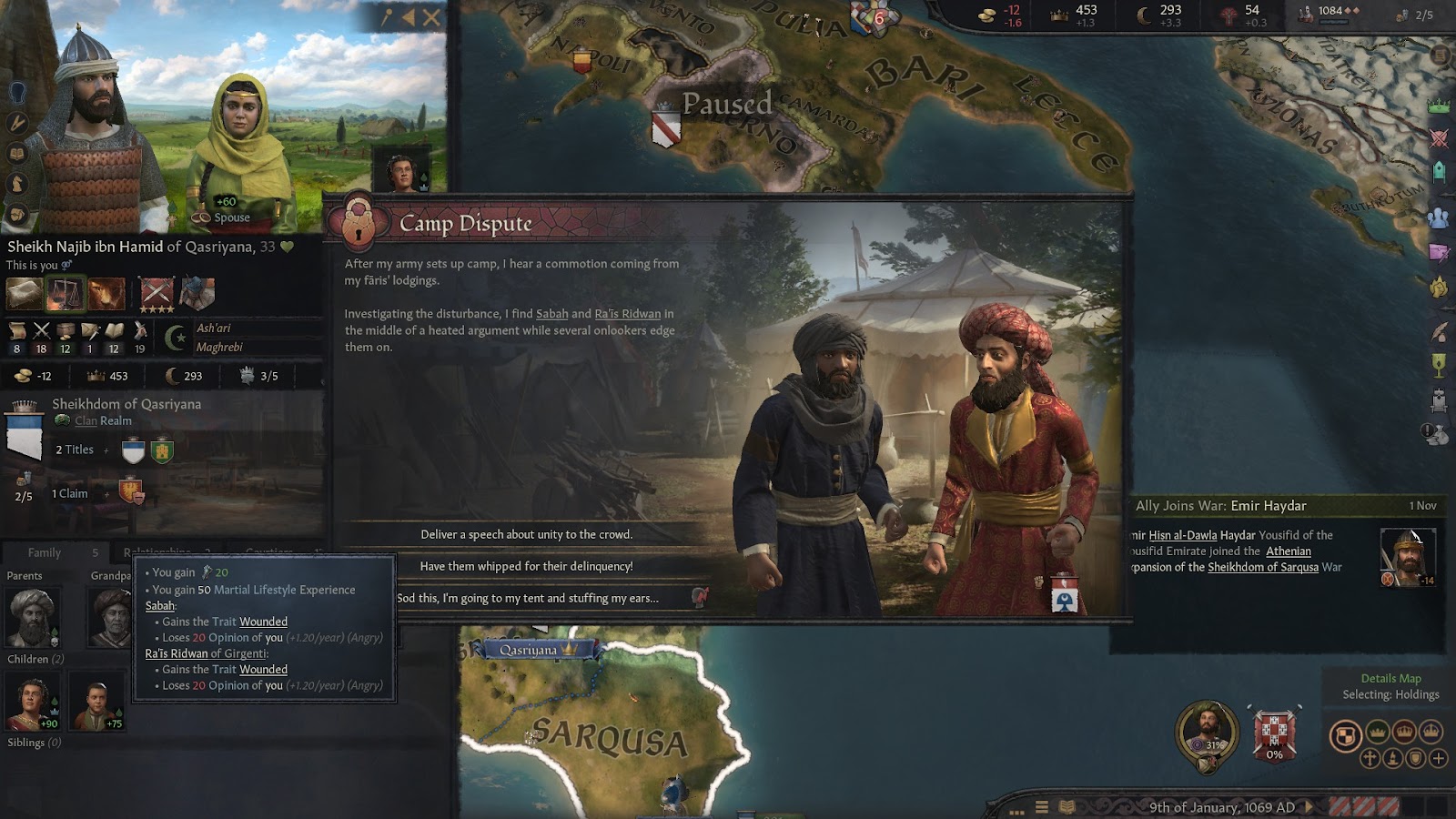
The desperate state of the finances lead to some arguments breaking out between the spymaster and the steward. Najib had them whipped for delinquency, too lazy to put anymore thought into the matter. This incident gives us some insight how Nijab's court functioned. His council largely ran the country for him in their domain of expertise, hence when the spymaster had a problem with how the finances were being handled he didn't bother going to Nijab, he argued with the steward, and Nijab only interfered when it interfered with the morale of the military campaign
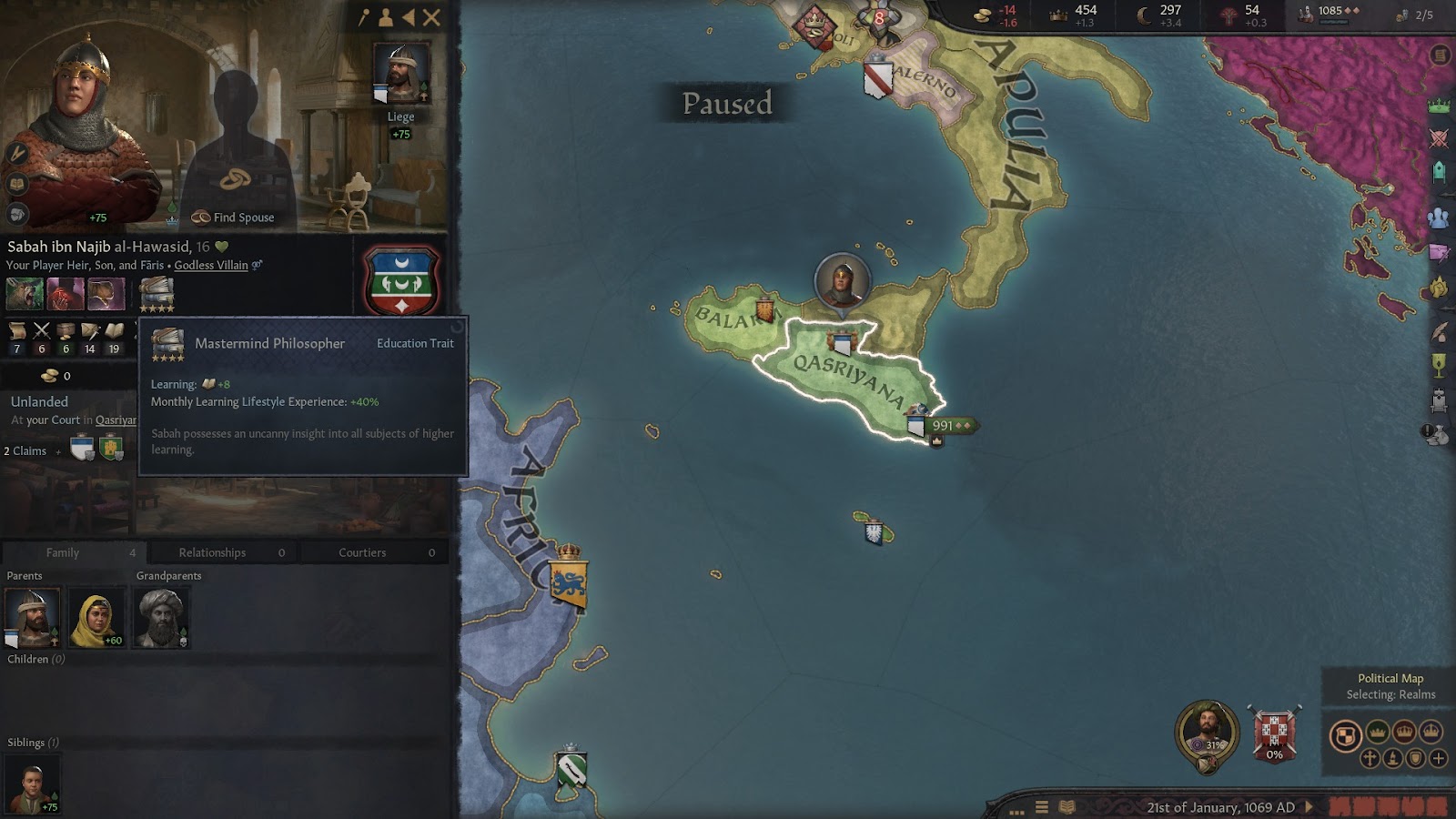
On February 12 1069, Najib heard word of 1500 men landing on the shore of Sarqusa, and unlike with the Zirids he doubted his ability to halt them. He made the decision to abandon Syracuse and wait for his Yousoufid allies to show up. In order to prevent Sarqusa from falling too early, Najib adopted an “army in being” strategy, where he would wait in his fortress in Qasriyana, then move to Caltigarone and threaten to march on Sarqusa as the Byzantines sieged it. Threatened with being pincered between Najib’s forces and the garrison of Sarqusa the Byzantines had no choice but to respond, lifting the siege, then Najib could flee to his fortress in the mountains of Qasriyana, his work done. He hoped to keep this up long enough for his allies to reinforce him. However, unbeknownst to him his allies were dealing with a rebellion in their lands and would take months to come, could Najib ibn Hamid hold on that long?
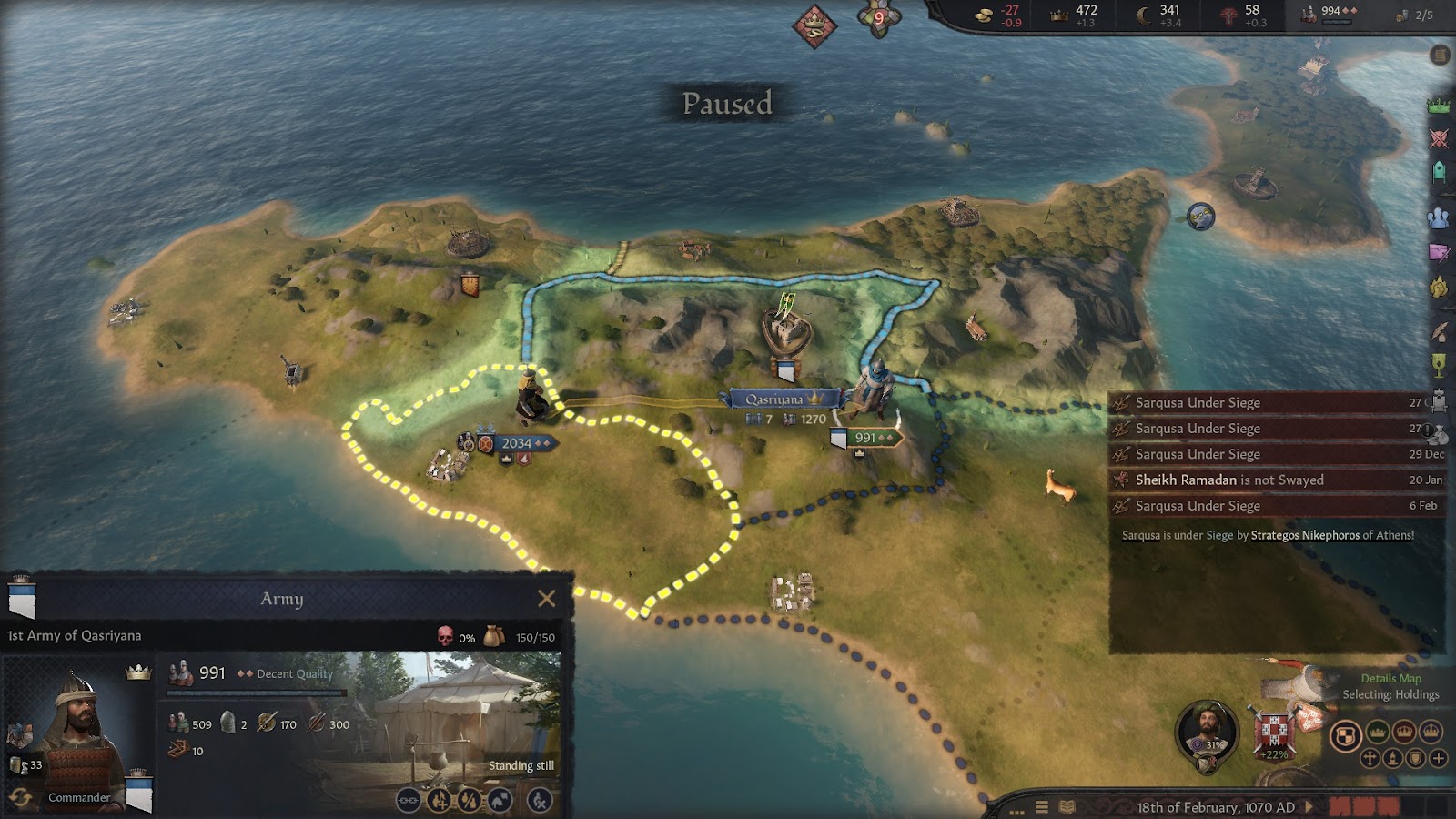
On February 18 1070 AD, the Yousifids arrive in force, all 2000 men. It is everything Najib could have hoped for. He immediately links up with his allies and makes plans to march on the Byzantines sieging Sarqusa
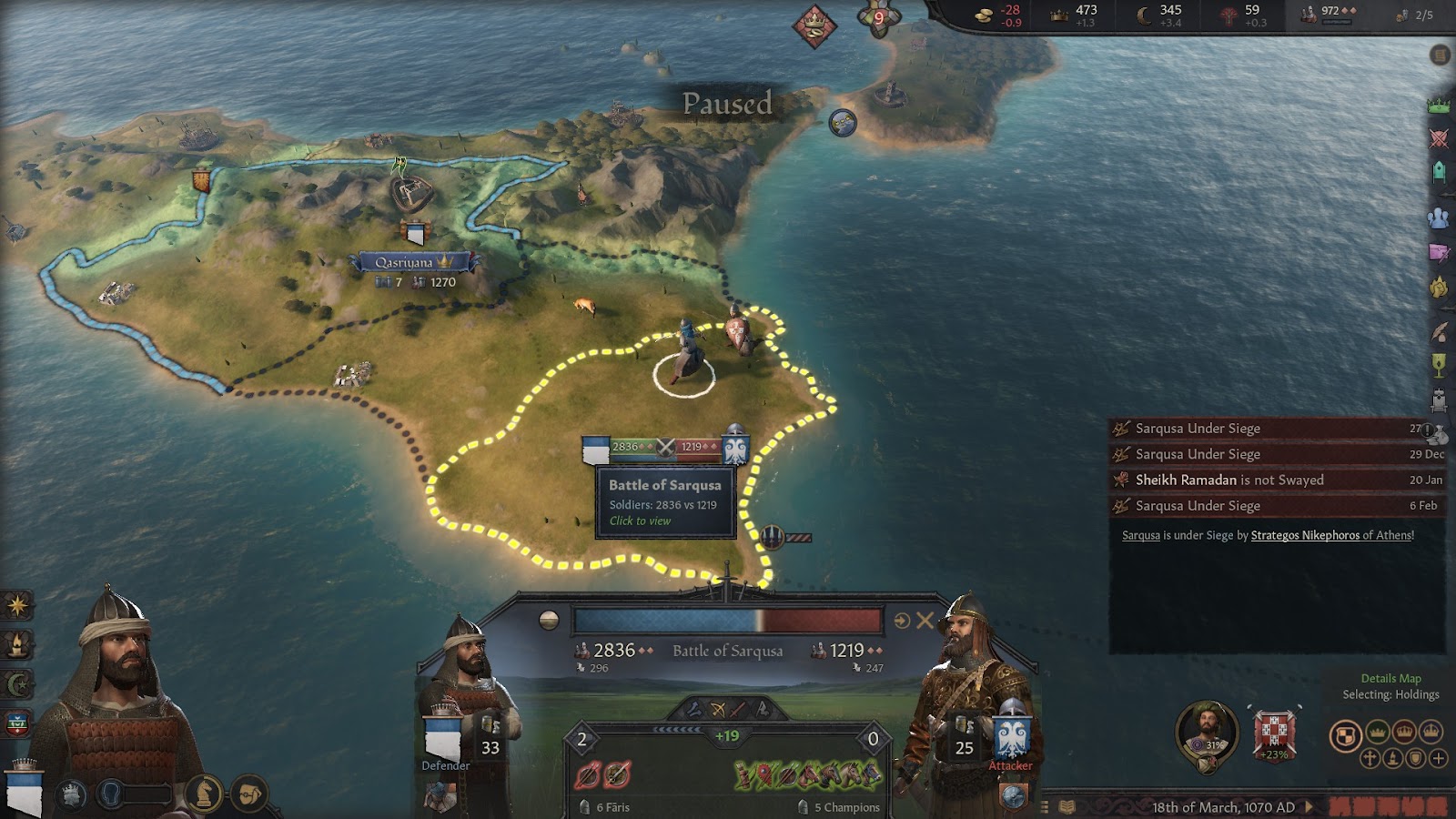
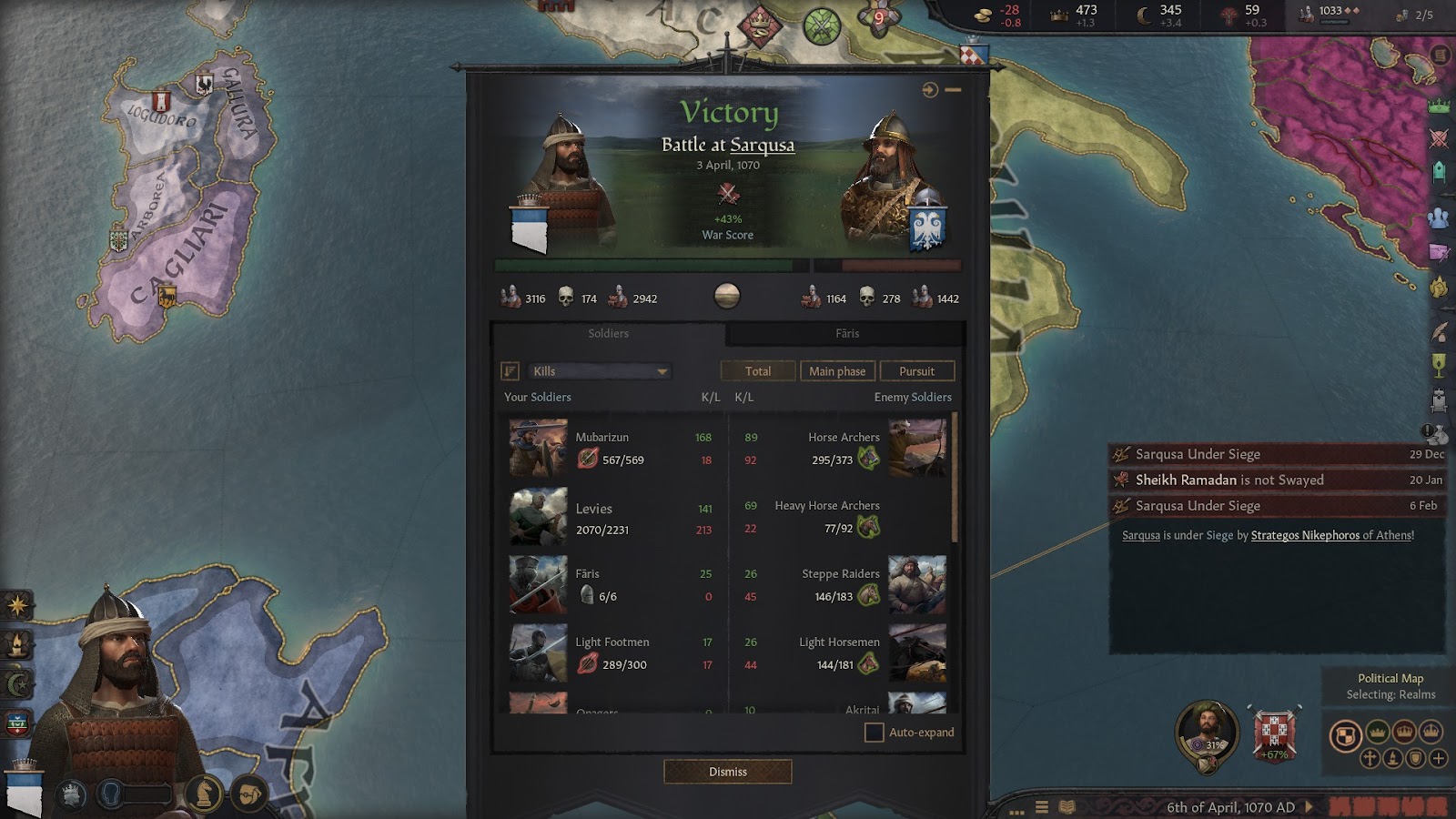
The battle of Sarqusa begins on March 10,1070 and it ends with a victory, mashallah! Sicily is saved. It can hardly be called an overwhelming victory but Najib can sue for white peace if he wanted to, but with his coffers empty and his soldiers grumbling, he knows he needs a more overwhelming peace deal if he wants to keep his soldier’s faith in him and his ability to unify Sicily intact. And with the Yousifids here, why should he make peace?
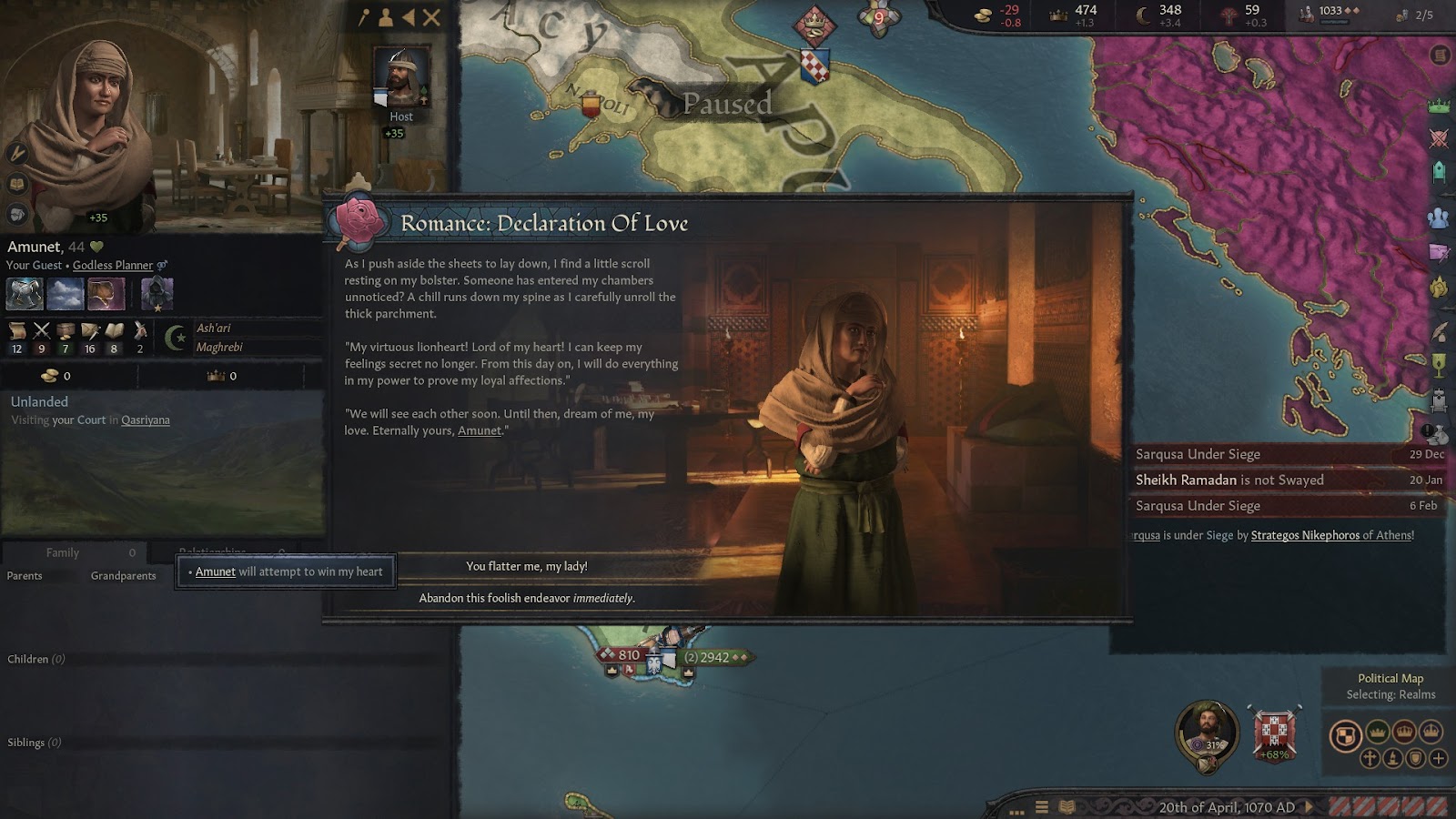
Not just in the battlefield of war, but in love too is the sheikh winning, being pursued by a desirable woman such as Amunet! Flattered he encourages her advances.
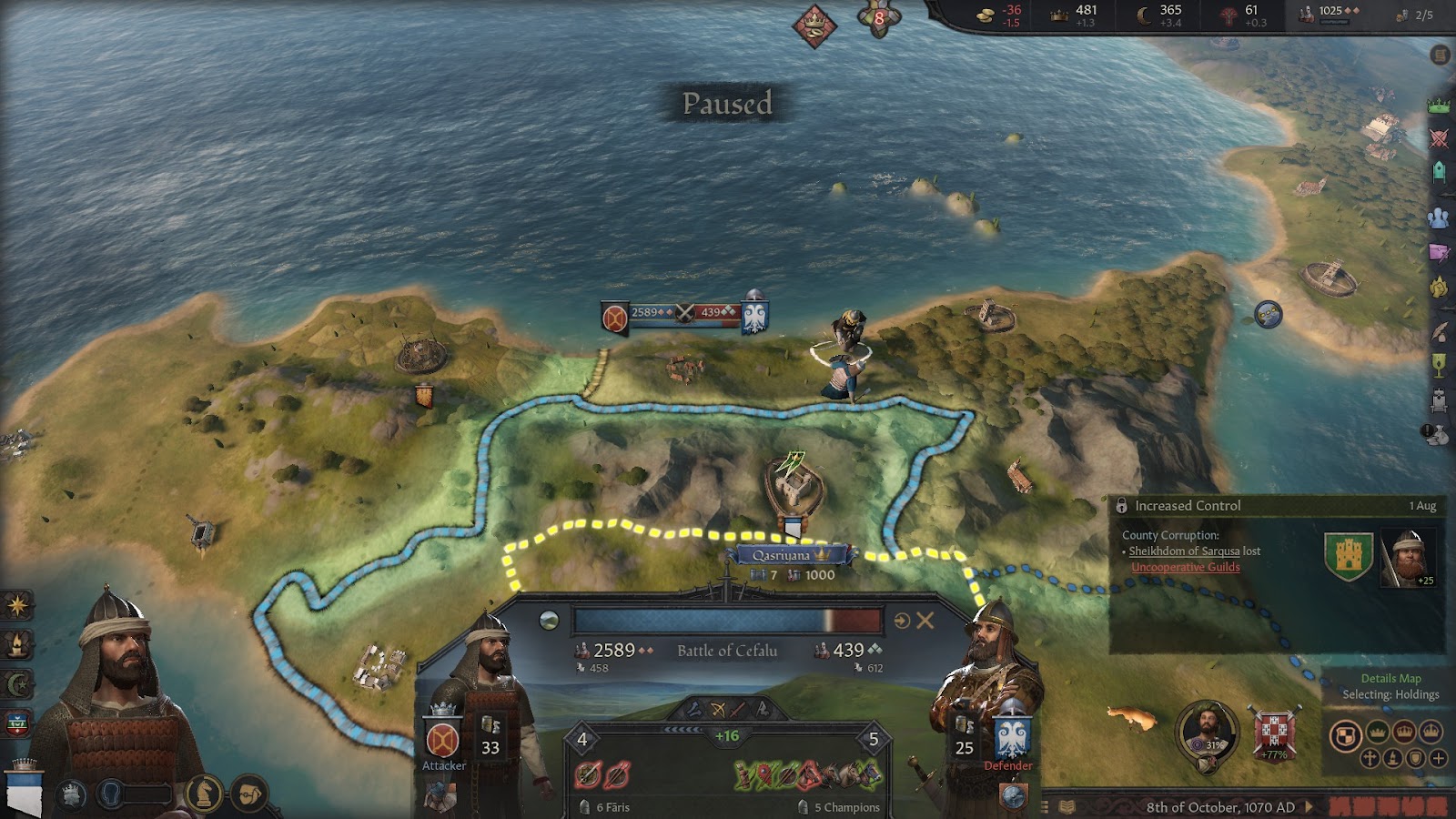
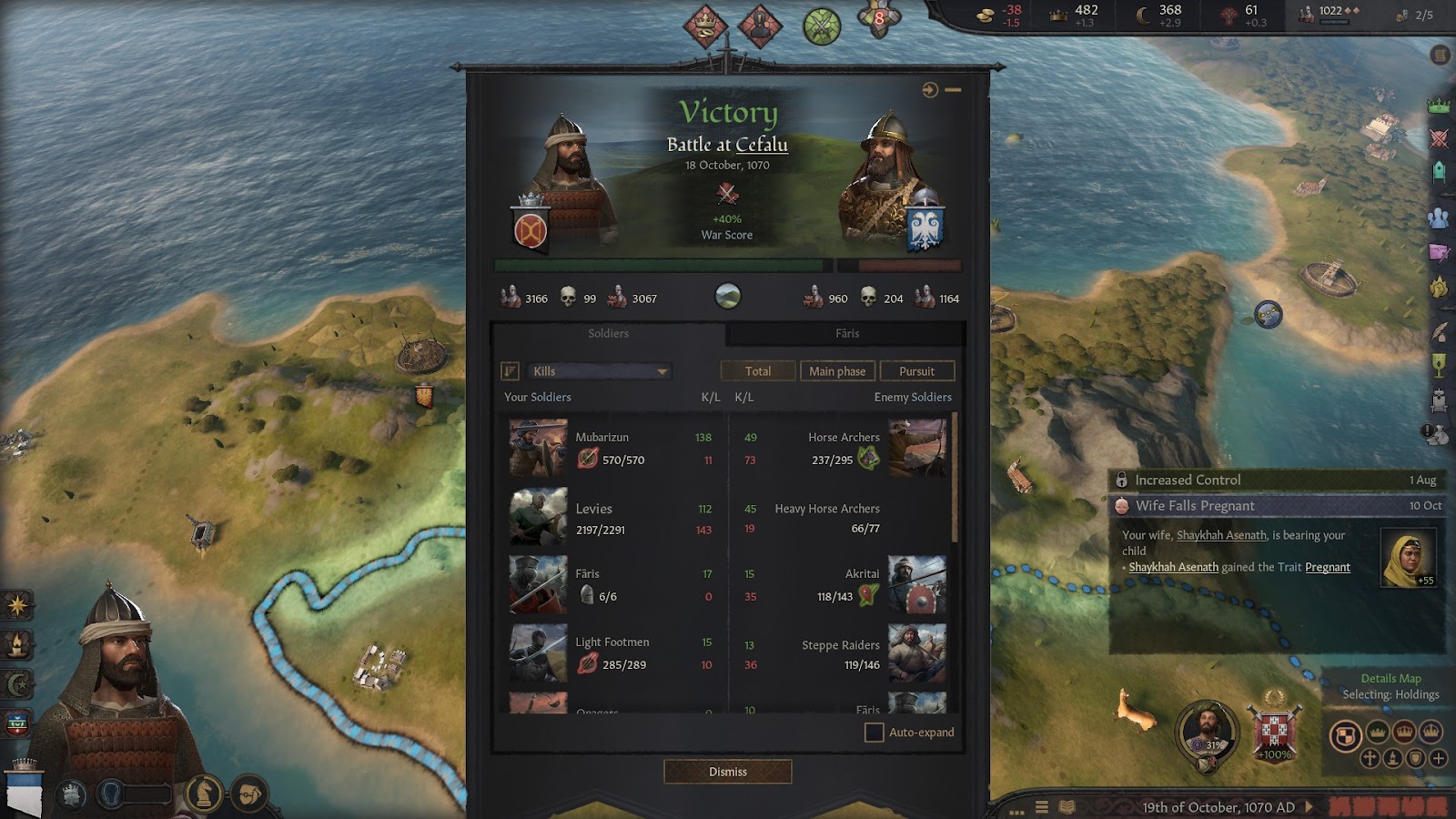
The Byzantine forces are caught as they attempt a landing through Cefalu, given tacit permission by the Normans, by Allah, all the enemies of Islam conspire against Sicily! It is no matter though, Najib crush them handily with his allies.
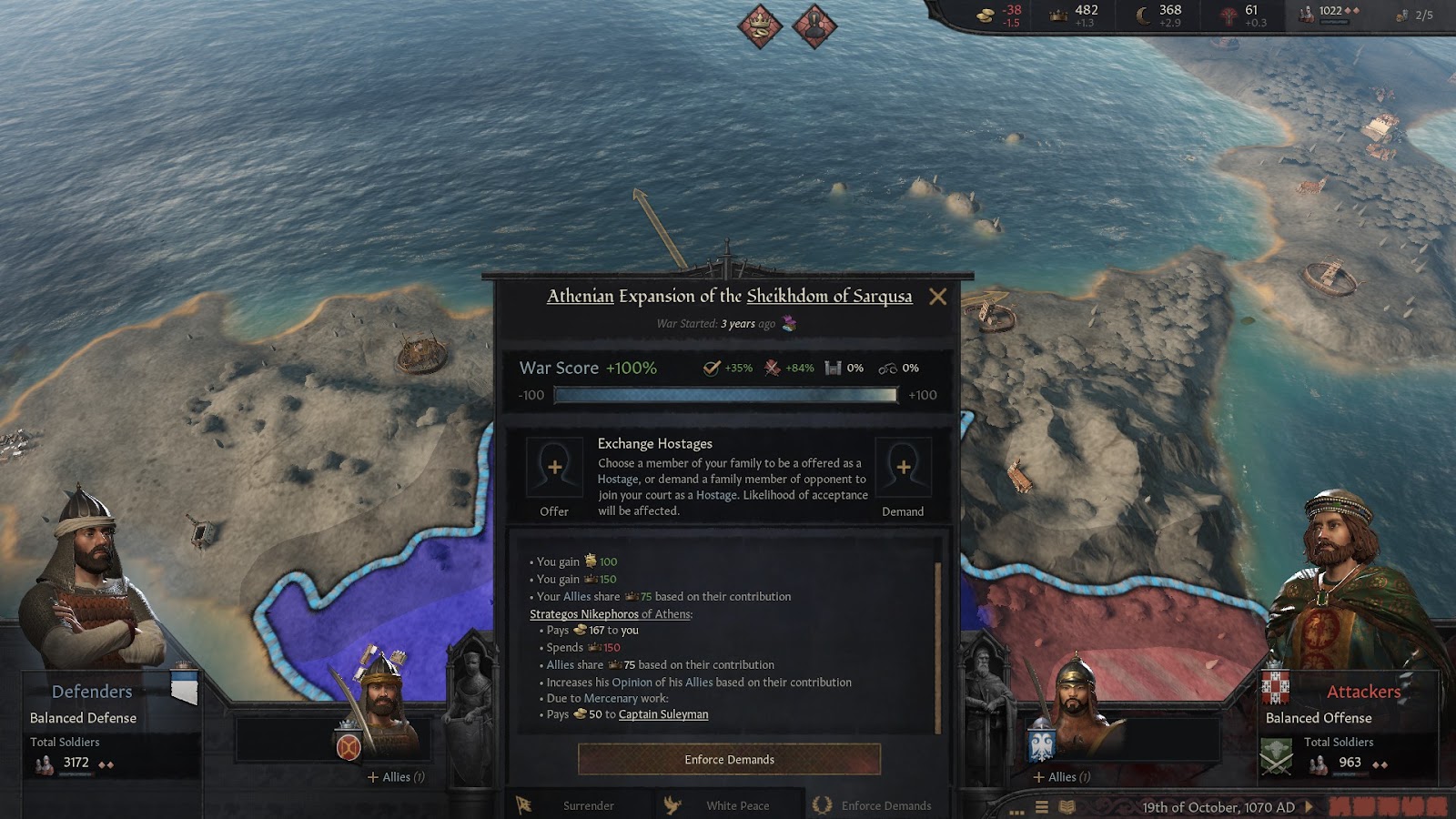
The strategos of Athens is forced to sign a humiliating peace that refills Najib’s coffers on October 19, 1070
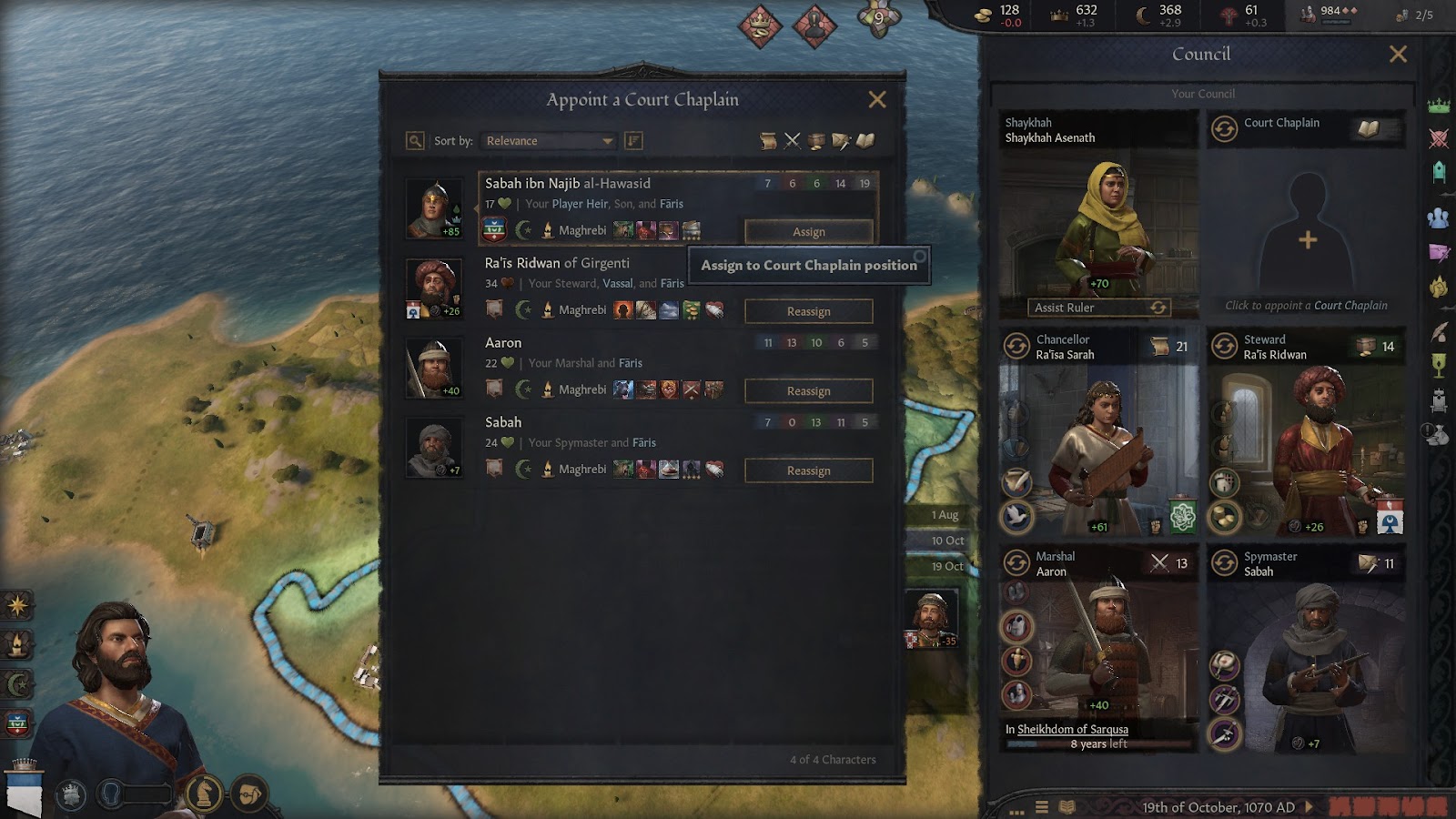
The former court chaplain, a bumbling fool of poor learning, died in the battle of Cefalu, letting us grant that position to our son and heir, strengthening our religious authority within the realm.
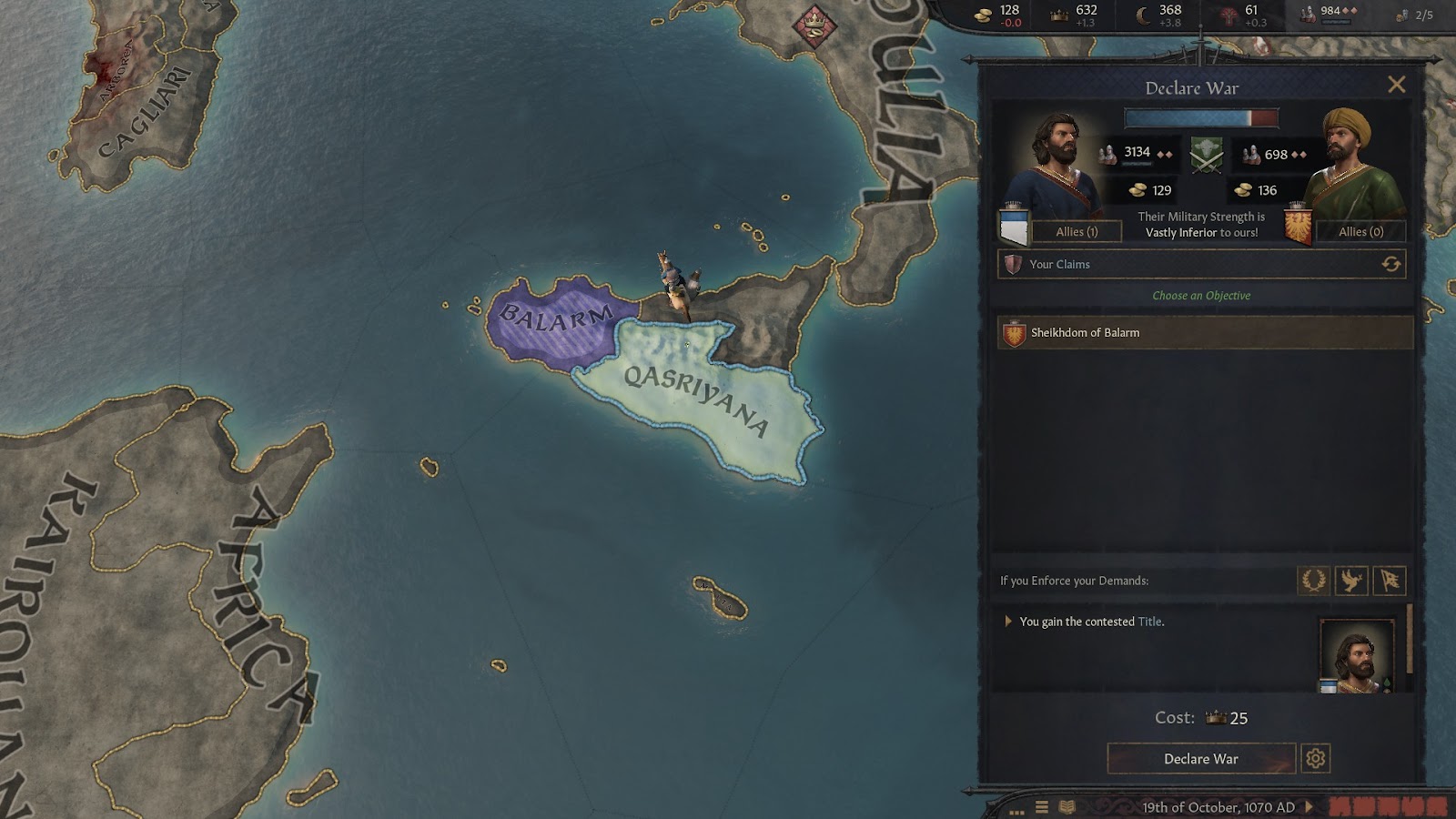
With the Byzantines no longer breathing down the back, Najib finally has time to take care of his last bit of unfinished business - ejecting Sheikh Yusuf II ibn Abdallah, the Zirid puppet in Balarm. He sends a letter demanding the sheikh submits to him as the rightful governor of Sicily, and when Yusuf II refuses, there is war. Yusuf’s Zirid masters turn tail and abandon him before Najib ever sets foot out of Qasriyana, having learned their lesson in Sarqusa. They flee in boats back to Ifriqiya.
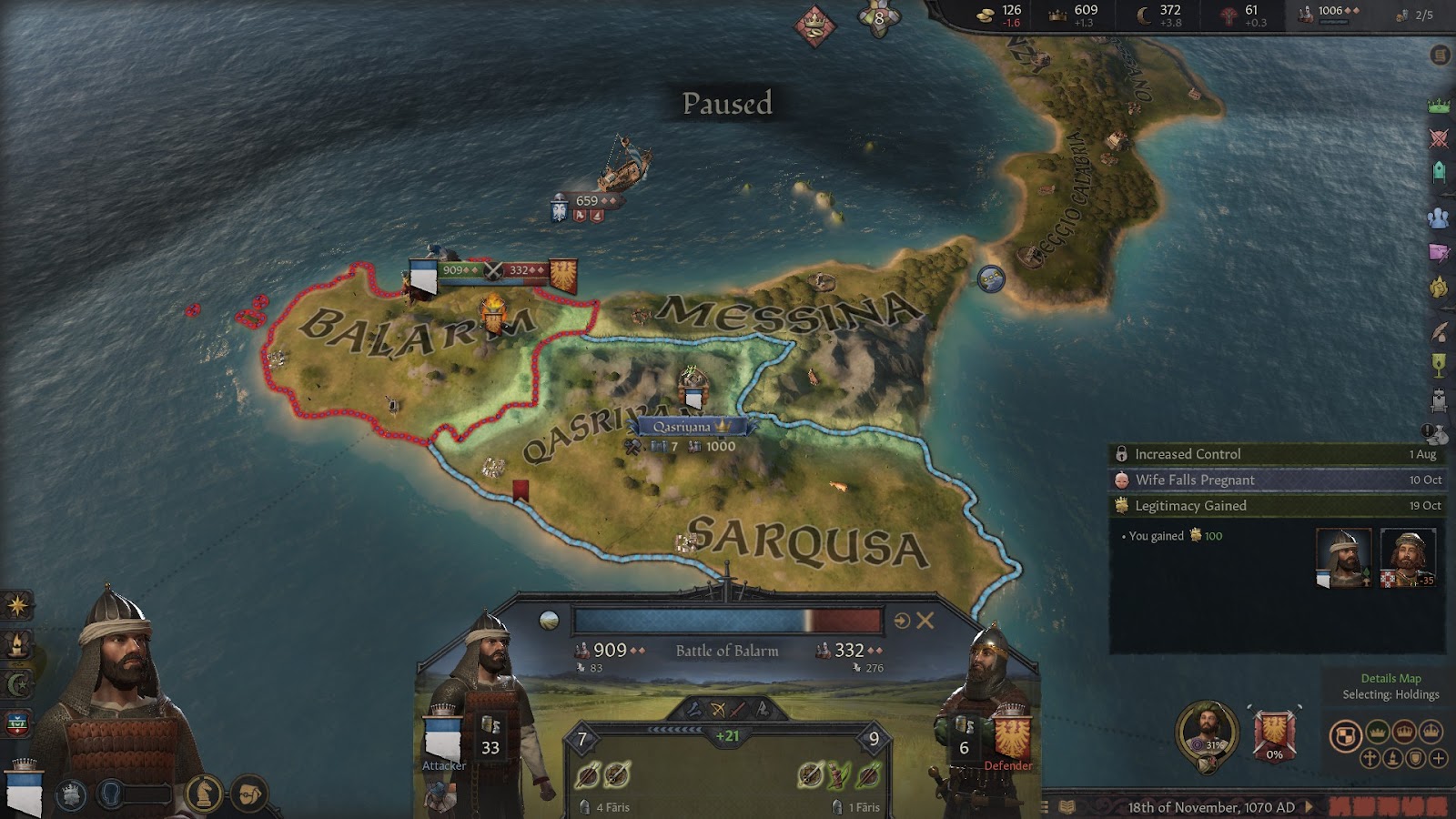
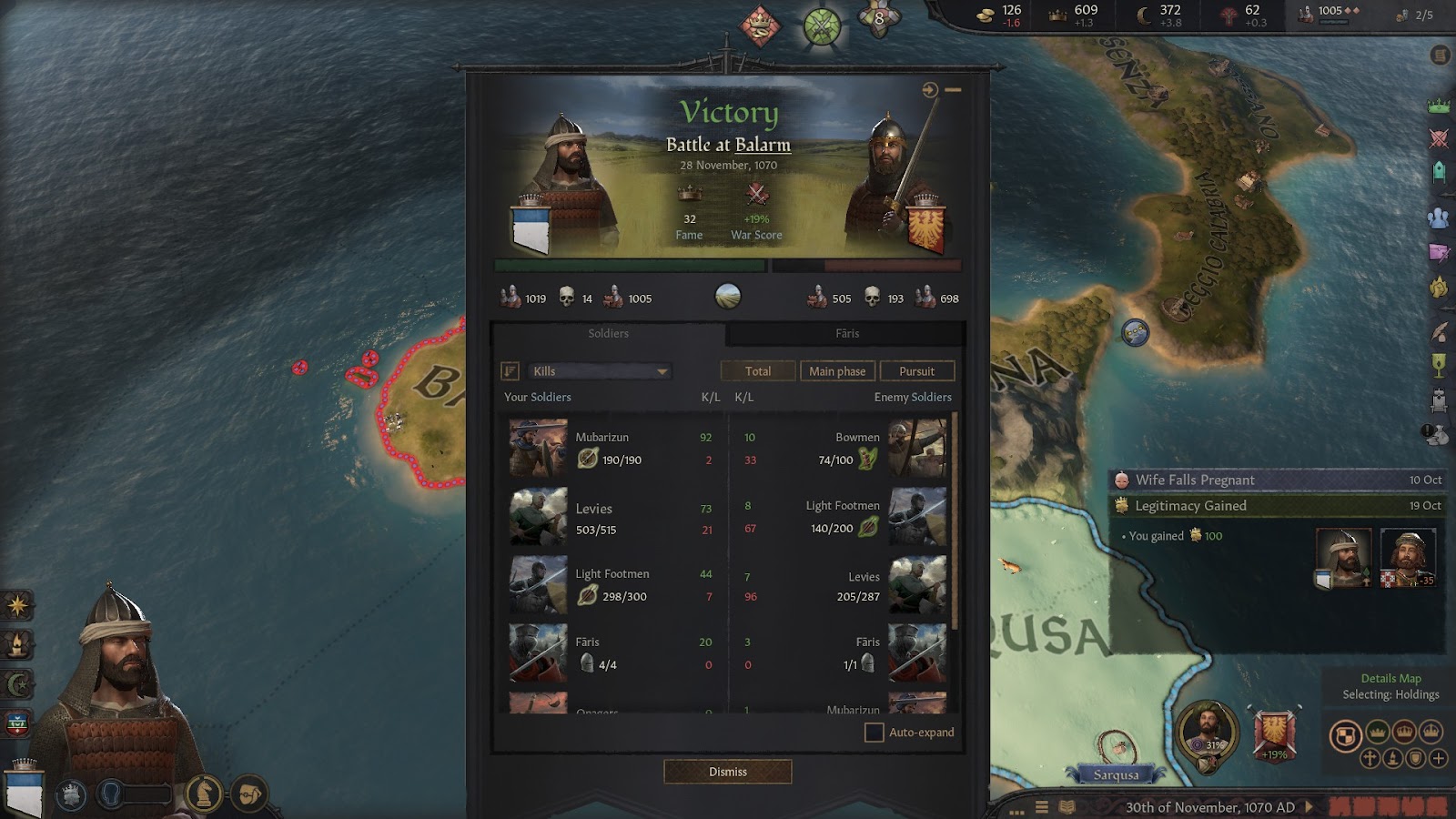
After a brief skirmish at Balarm, Sheikh Yusuf’s army is broken and flees the city allowing Najib to besiege it without worry. For the entire time, the remains of Yusuf II’s army stands in Mazara, too dispirited and disorganized to mount any kind of response. All that’s left is for the city to surrender
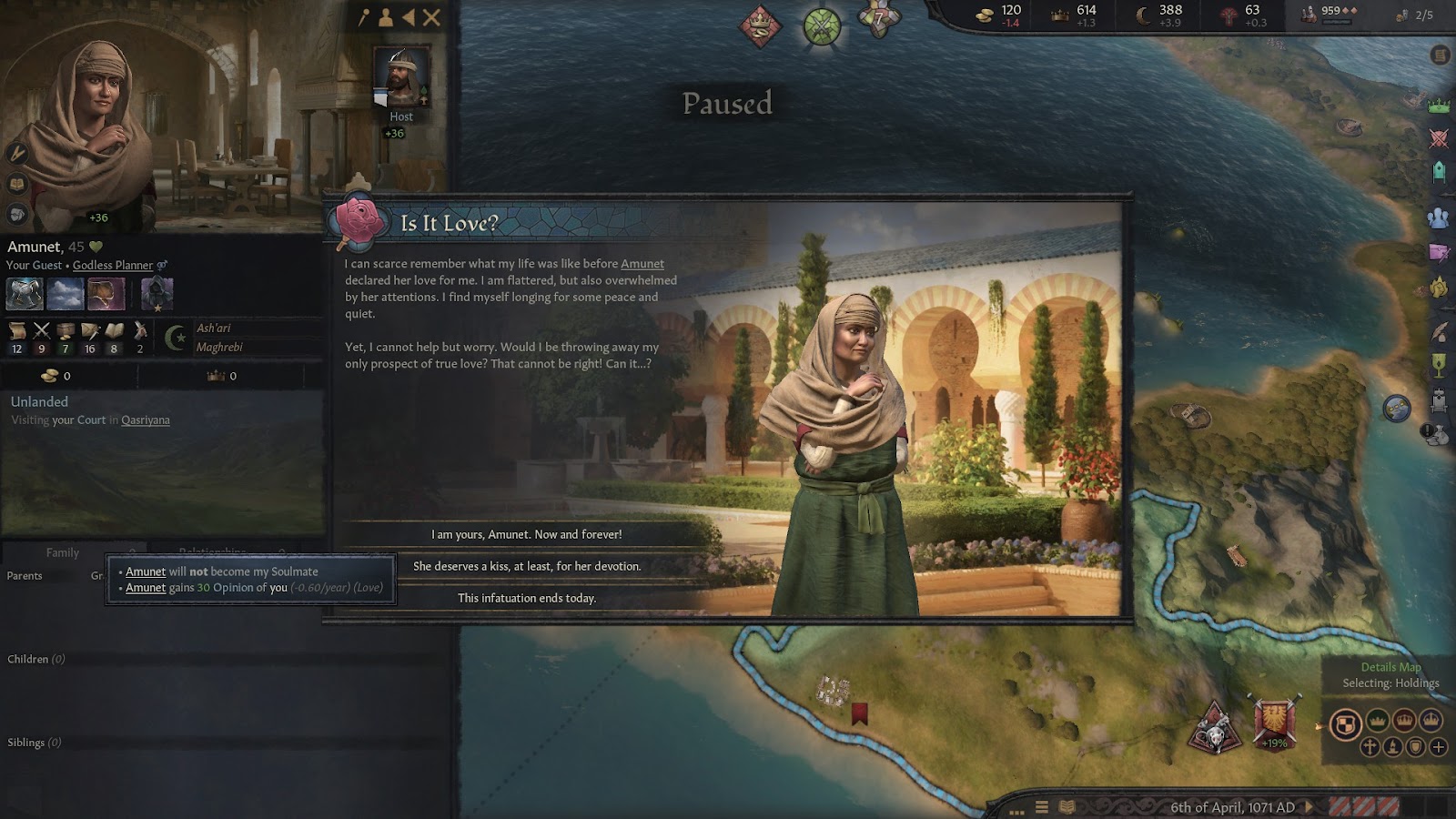
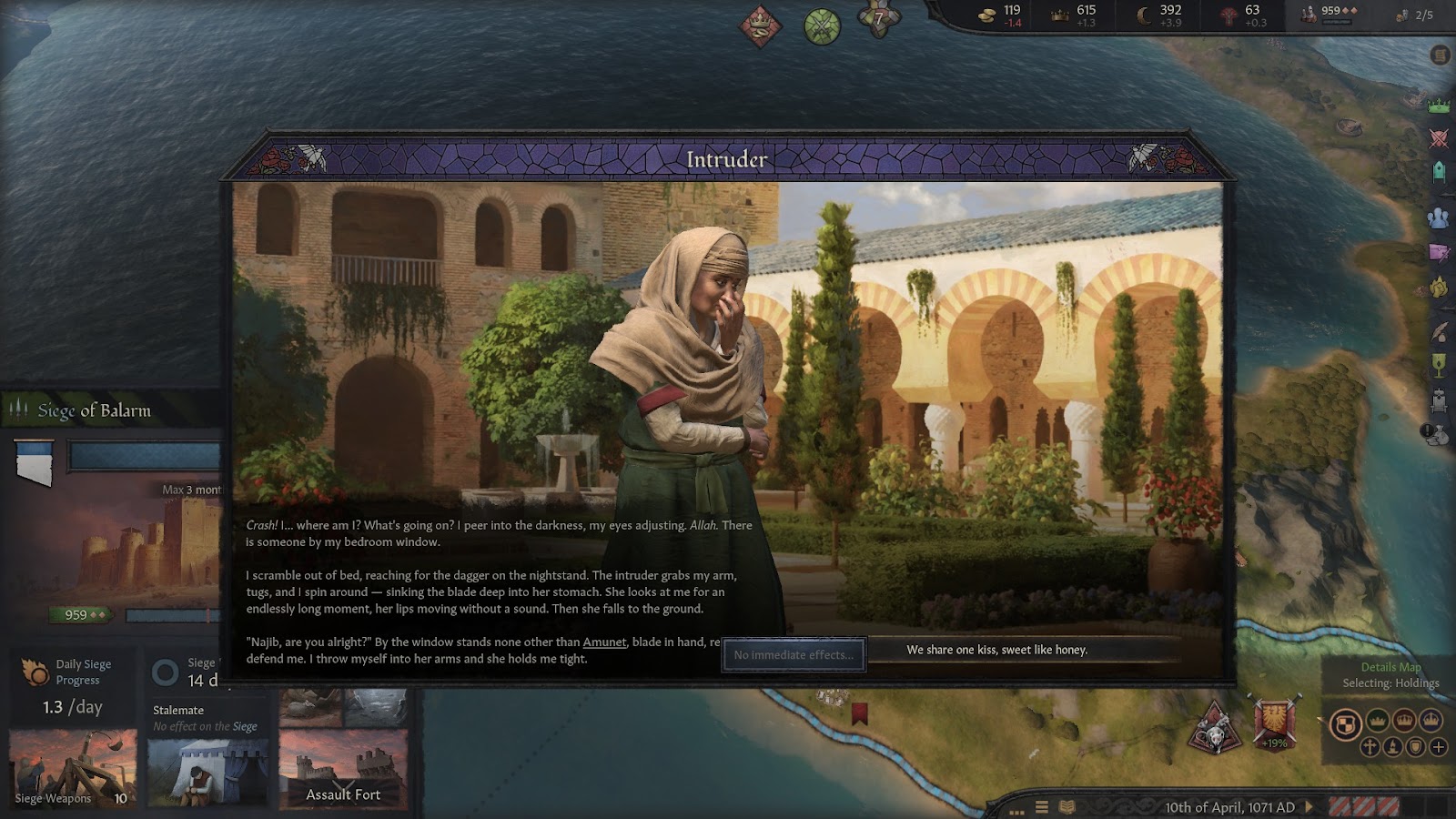
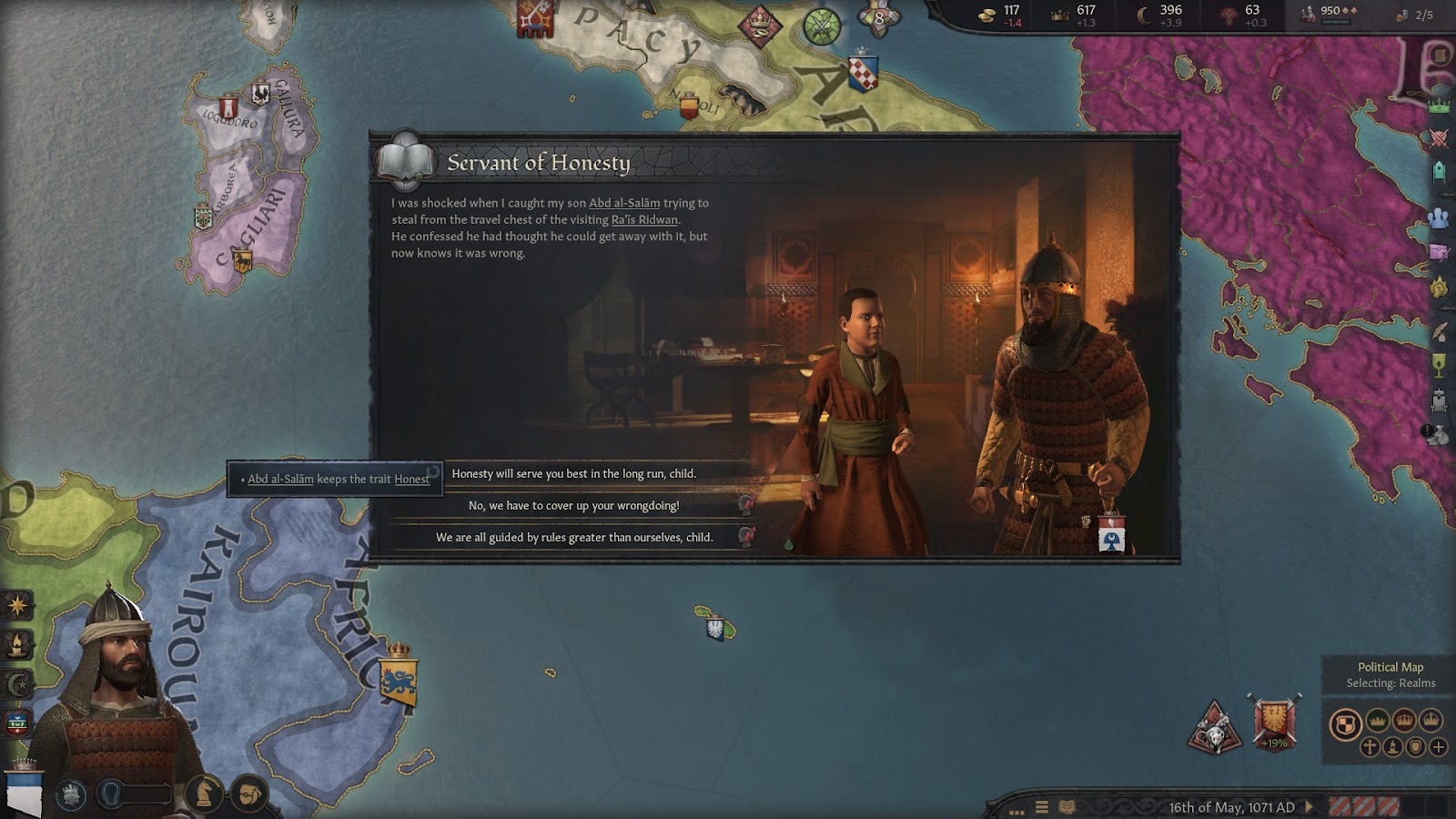
While Balarm is being sieged, another battle is being waged, one inside Najib’ heart. Torn between his sense of justice, shaped by Islamic teachings on what men owe their wives (fidelity, honesty, modesty) and his sense of gratitude towards Amuneth. In the end he cannot say he is her soulmate, but he can say he cares for her. Perhaps this conflict is why he tells his second son to be honest with the people in his life, as his father could not within his marriage.
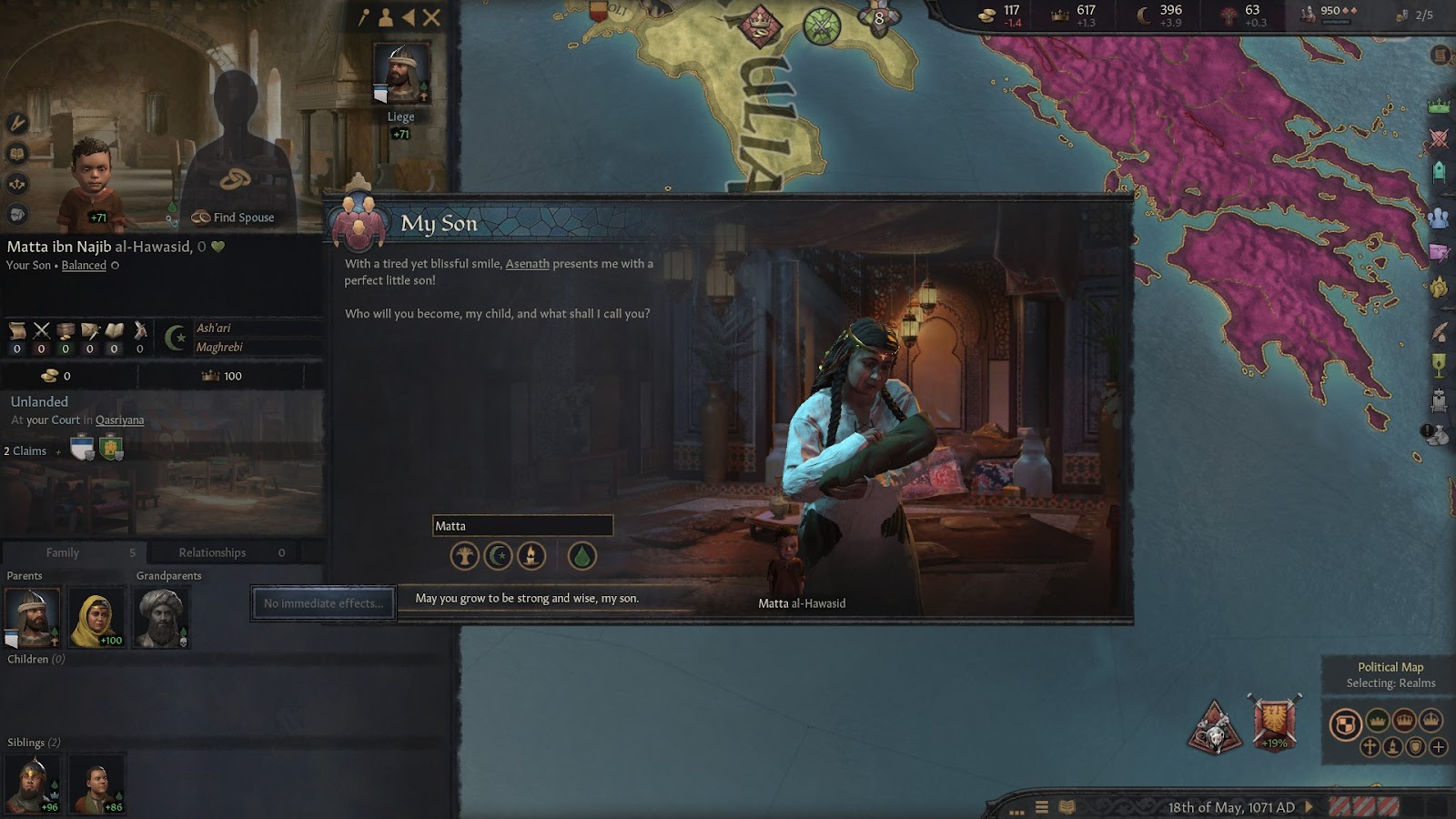
May 18, 1071, Najib’s third son Matta is born
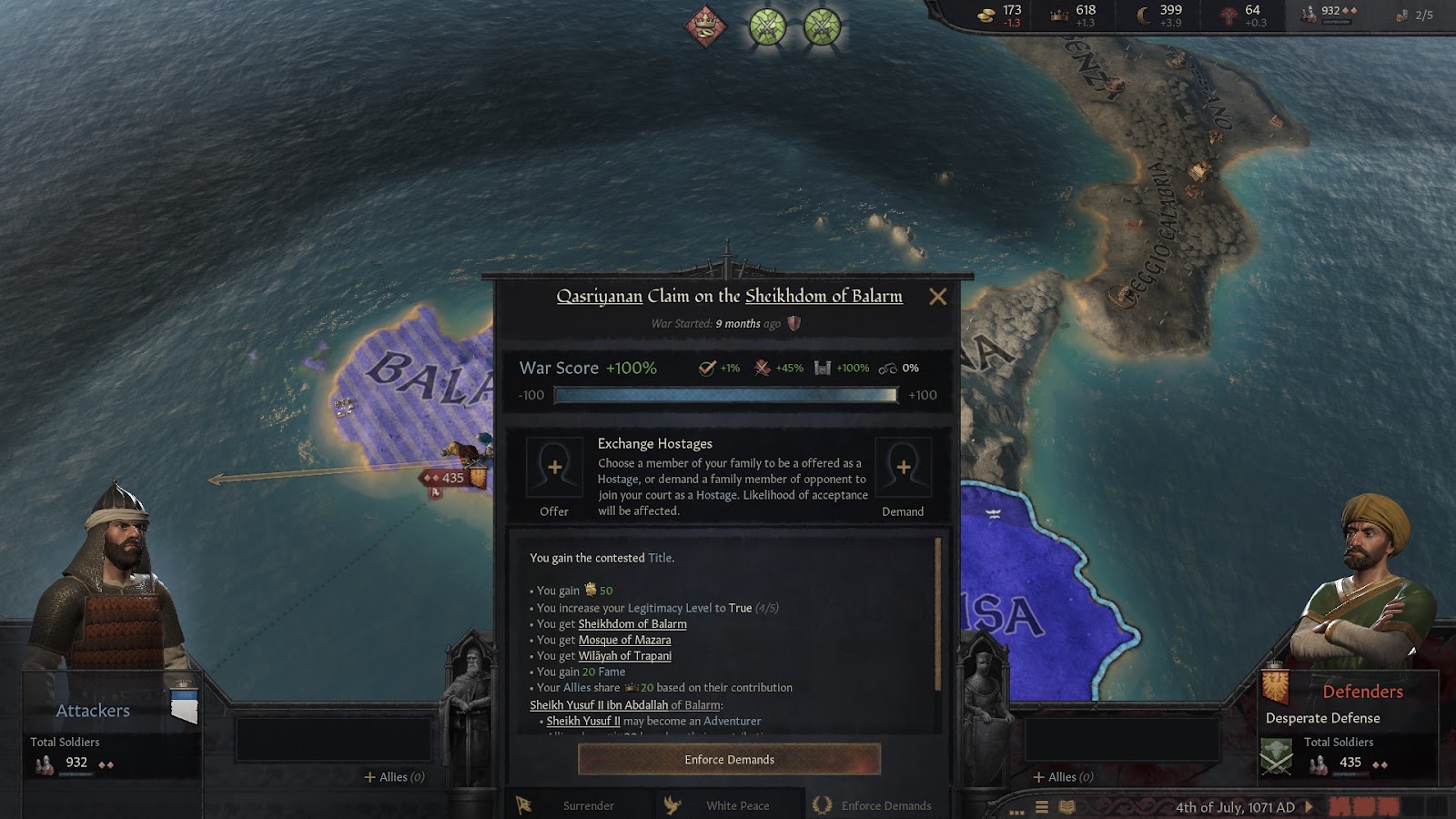
On July 4, 1071 after Balarm surrenders and after all prisoners have been ransomed, Najib officially makes peace, seizing Balarm for his burgeoning domain. Now he can truly call himself governor of Muslim Sicily having unified the most important parts of the island
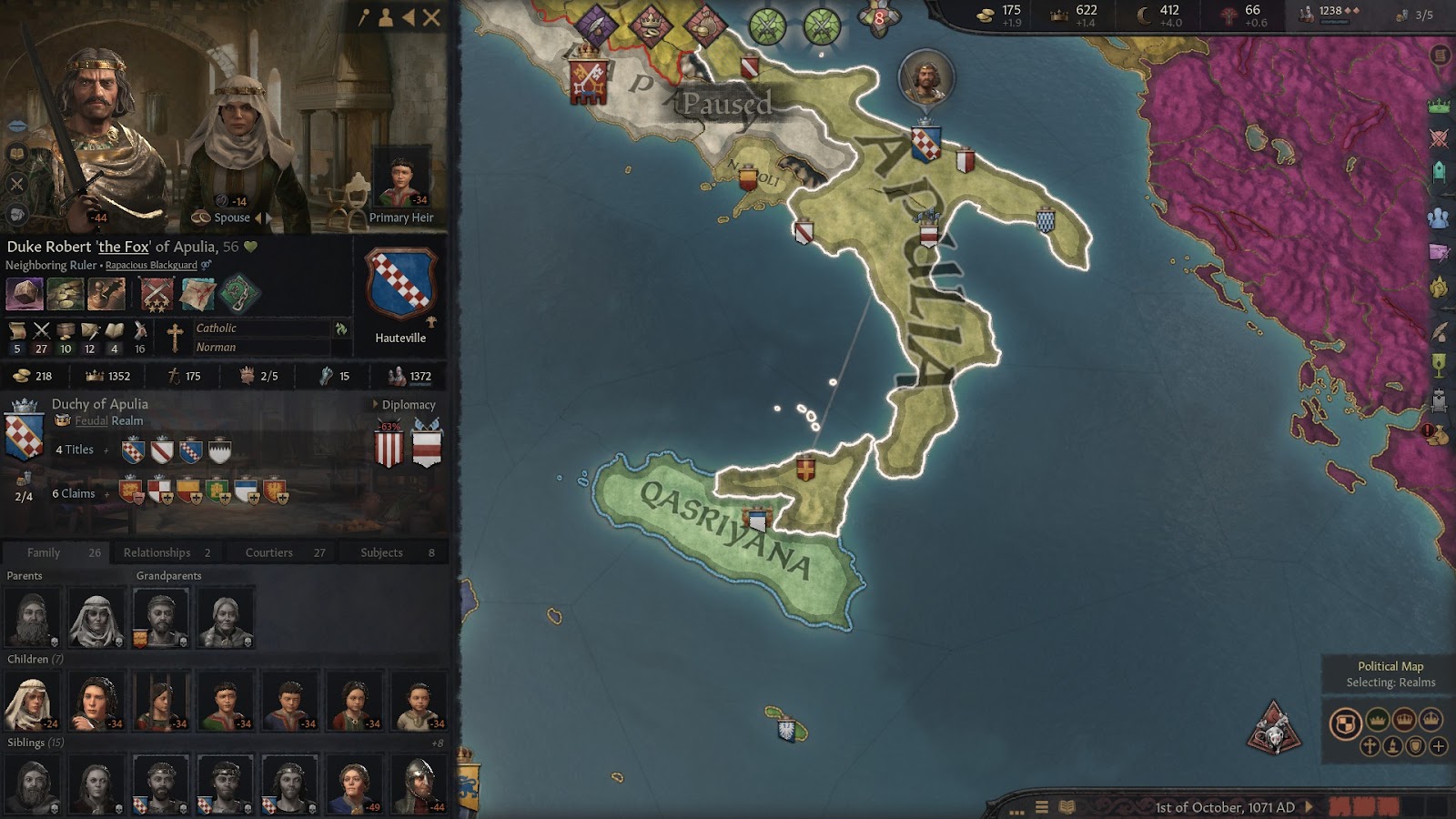
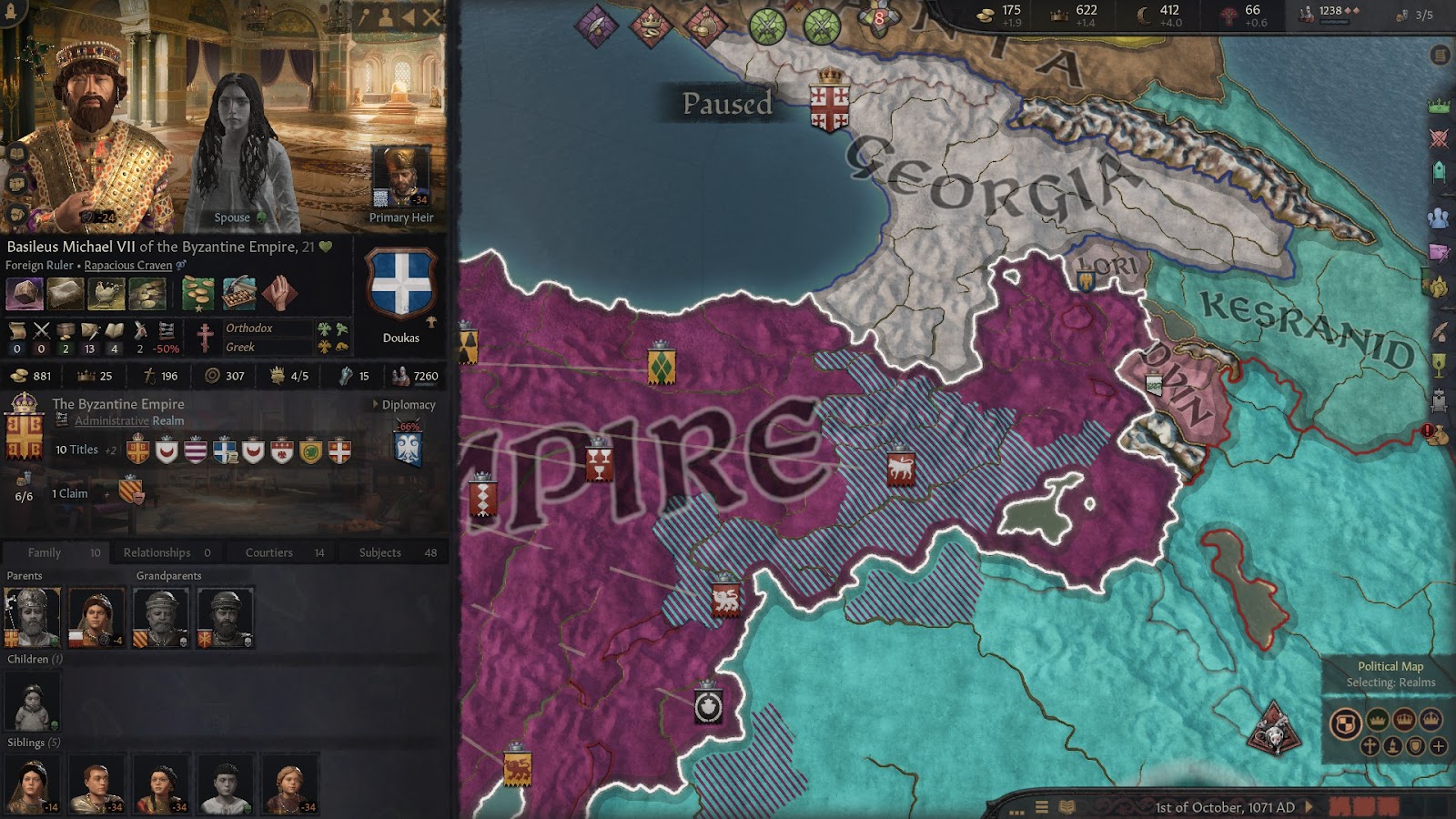
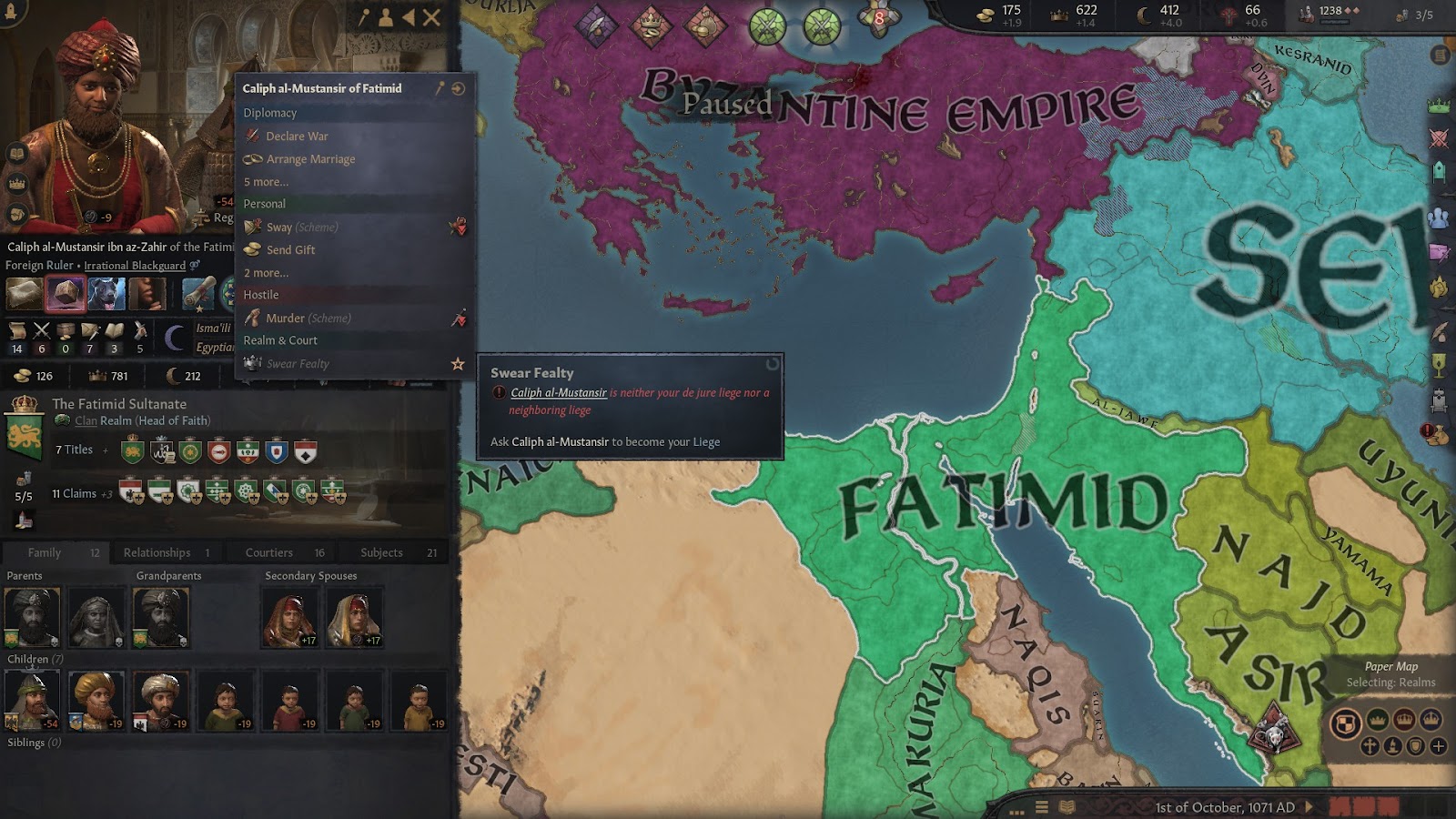
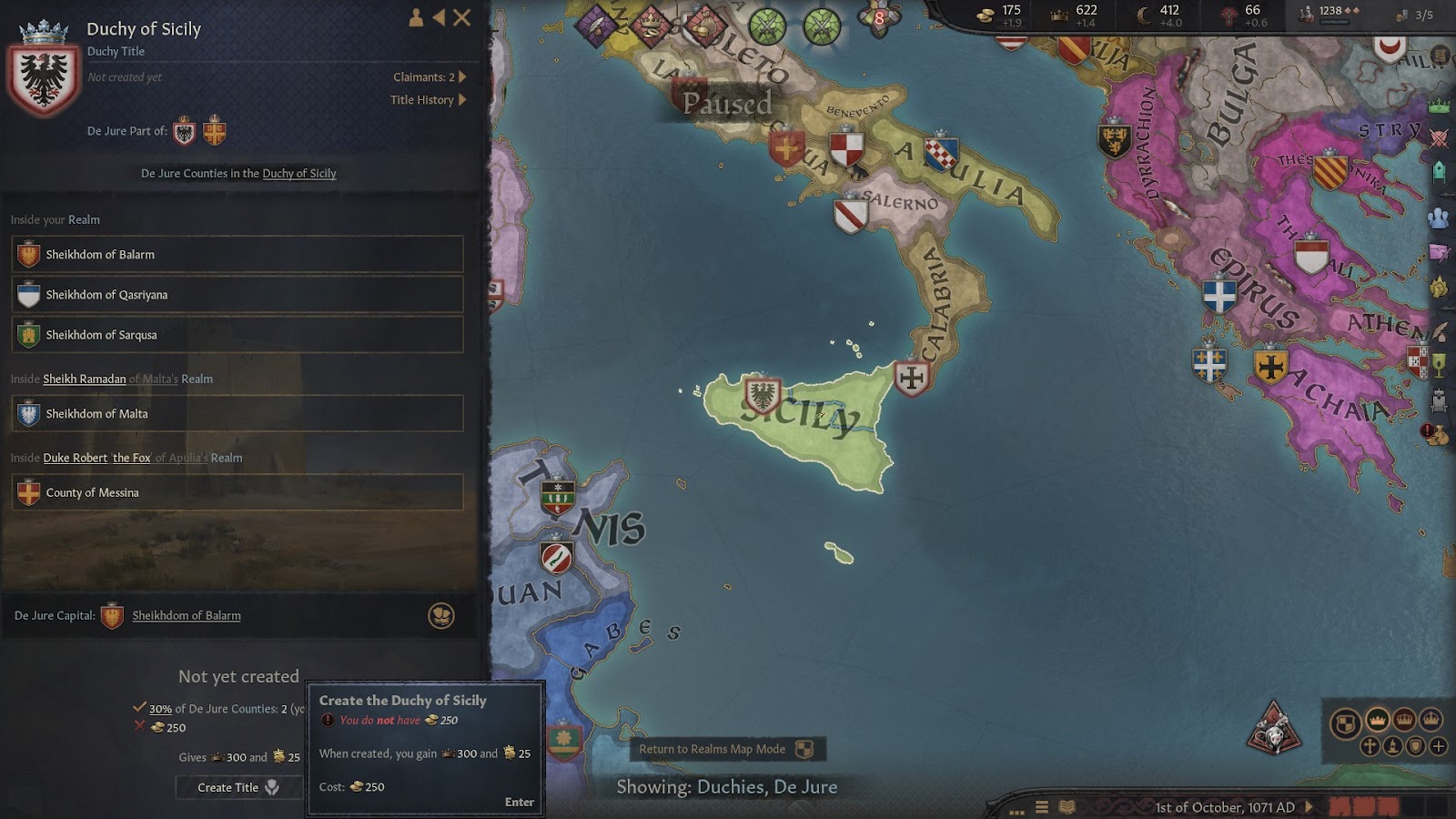
It is October 1, 1071. Nearly five years of constant fighting have passed, but finally the two decades of strife and civil war that have dogged Islamic Sicily are at an end. Through sheer nerve, tactical brilliance and allies, the unfit dogs of Saraqusa and Balarm were forced to submit and the Byzantines were fended off and Najib can relax and take stock of the wider situation. First a look at his most fearsome enemies - the Normans and the Byzantines. The Normans have been defending their right to hold Lanciano against Matilda’s claim on it as de jure part of the duchy of Spoleto. They are slowly but surely losing this war. So are the Byzantines, who are being rocked by an invasion of Armenia by the Seljuks. However Najib knows that its only a matter of time before some strategos or the Normans decide to press their luck again, and he can’t say he’s prepared to meet them. He needs protection and he needs it now. And so he turns to the Fatimid Emperor, hoping to strike some deal. He wishes to be recognized as the emir of Sicily and formally enter the Fatimid's protection, completely willing to submit to Shia Islam if need be, however the Caliph refuses his offer, possibly worried about the logistics of offering protection now that Ifriqiya has slipped from the Fatimid grasp.
Can Najib unite the squabbling Muslim factions just on his personal prestige and skill at arms alone? Or is Sicily doomed until it can unify all of its people into one Siqilyan identity?
Note: Historically by this point, the Normans have inflicted a second devastating defeat on the forces of Palermo in 1068 which convinces the Zirids that Sicily is a lost cause and they flee back to Africa abandoning their puppet ruler, and the Norman forces begin a siege of Palermo in 1071 that ends with them entering the city in 1072, which culiminates in a two decade long campaign to break the resistance of the island to Norman rule. So I think I'm doing pretty good.
1066-1071: Consolidation
1071-1078: Preparations
1078-1082: Jihad
1082-1086: Murder
1086-1094: Sultanate
A note on historical accuracy: Some of the details I mention like the rivalry between my main character and the sheikh of Syracuse are not part of CK3 proper, but gleaned from this wikipedia article https://en.wikipedia.org/wiki/Battle_of_Cerami. and other wikipedia articles about Muslim Sicily in this time period (yeah I know Wikipedia isn't the best source but this is an AAR not academia) I don't think CK3 is very accurate to what the actual situation was like in Muslim Sicily in 1066 which fair enough, they'd be conquered by the Normans in 30 years anyways and I think I might be the only one who cares about them vs everybody who cares about Robert the Fox.
I noticed there's a dearth of AARs with Islamic rulers/ dynasties, so I figured I'd do one.
The year is 1066, and things are not going well for the Muslims of Sicily. The island had been rife with factional conflict since 1010's between various pro-Zirid and pro-Byzantine factions, with the Kalbid and thus Fatimid hold on the island slipping away almost entirely. By the time the final Kalbid governor died in 1053, the island was hopelessly divided with the Zirids holding sway in the traditional capital of Balarm but not much else outside of it. 5 years prior, the Normans took Messina, heralded by the traitorous Greek Orthodox as liberators and had frustrated efforts to dislodge them by winning a stunning victory at the battle of Cerami in 1063 over a combined Zirid-Sicilian force (predominantly made of soldiers from Balarm but the ruler of the stronghold of Enna and some other figures from central Sicily were also cooperating) which spelled the end of any hope of the Zirids managing to control much more than Balarm as the native Sicilian blamed and resented them for the loss, and ended any hopes the Normans could rapidly be expelled from Messina. The Normans had been prevented on following up on that victory only by an outbreak of rebellion in Roger's Calabrian holdings, but it was only a matter of time before the Normans came to take the rest of Sicily, promised to them by the Pope. If Muslim Sicily had any hope of surviving, it needed a miracle. Instead what it got was Najib ibn Hamid, a brilliant strategist, an average steward and learned man and a terrible diplomat and schemer.
A profoundly lazy man, he would have preferred it if someone else could do the work of uniting Sicily, however, Syracuse was ruled by his rival who had entreated the Normans for aid and promised to recognize their claim over Sicily to destroy his uncle's aim of uniting the island, and the emir in Balarm was nothing more than a puppet of the Zirids, whose incompetence and cowardice was on full display at Cerami where they abandoned the brave men of Balarm to the enemy. No, it would have to be him.
Recognizing the futility of attempting sieges of any kind without siege equipment, he immediately set out to building onagers. However, uniting Sicily alone would not be enough, with larger hostile christian powers right on the doorstep, ties with the Fatimids or another Islamic power needed to be reestablished, the first step towards which was the offer of betrothal Najib made with the daughter of the Yousofid Emir. The Fatimids were a Shia Caliphate, and Ibn Hamid was Sunni, however such differences were more flexible than they seemed when the situation was desperate enough. Najib ordered the masjids to proclaim the Caliph al-Mustansir’s name during the Friday kutbah, which signalled his allegiance to the Fatimid caliph. A powerful lord who could boast over 2000 men, such an alliance would give Najib room to manuever as he took over the island, and legitimize him in the eyes of the Muslims of Sicily.
In November 24, 1066, Najib ibn Hamid marched against his hated rival, Sheikh Ali III, declaring him a traitor to the faith, and enforcing a claim to Syracuse as governor of Sicily restoring order and punishing traitors to the Caliph and the umma. This was a bold claim to make, the Fatimid Caliph had at this point not even acknowledged him and Sicily had traditionally been ruled by the Kalbids from Palermo, not from Qasriyana which was simply where the strongest garrison was. However, the shakiness of this claim belied a simple fact - the military had historically been one of the most important political players in the island, and the bulk of it, especially those situated in the fortress of Enna which dominated the center of the island, wanted Hamid to govern the island. He was a respected commander who had participated in many battles against the Normans and proved his capabilities and they would follow him to hell. In 1066, Najib had 818 men while his rivals in Syracuse and Palermo together could only command 975. Further his uncle had briefly controlled Syracuse from 1060-1062 (hence the need for Ali III to go running to Robert, Nijab's uncle was close to uniting Sicily)
As he marched on Syracuse, Najib received terrible news - the Zirids had allied his rival! The snake, not content with inviting the Normans in to deal with him had pledged himself to the Zirids as well and even married his daughter to the Amir. Najib was not impressed however, the Zirids had proven themselves incapable at Cerami, he was confident he could take them. But it was even more likely that the war would be over before the Zirids could meaningfully be involved
In October 21, 1066, Najib ibn Hamid’s forces met Ali III on the plains of Lentini. The battle was a slaughter for Ali’s forces, half of them were wiped out. The victory wasn’t totally without pain for Najib however, his spymaster and the mayor of Girgenti had died on the battlefield, his retinue wiped out to the last man. A calming influence on his liege he will be missed. Sheikh Ali was captured in the battle, but ransomed back for 50 gold, along with the mayor of Caltagirone (who was ransomed back for 28, not having the customary 30).
The Zirids came, and were slaughtered as they landed, the siege of Sarqusa continues, and a few minor battles later, (and one more ransom of Ali for gold), Sarqusa was captured and on January 18, 1068, Najib officially became recognized as sheikh of Syracuse. Ibn Hamid quickly secured oaths of loyalty from Sarqusa’s inhabitants and defenders, when another disaster struck. The Byzantines were making their move.
Seeing opportunity in the fighting, the strategos of Athens had declared war on Ali for Syracuse, and saw no need to change plans now that Ibn Hamid had been recognized as the ruler. The council was quickly reorganized to plug any holes that had formed during the war, Aaron the chancellor became the marshall and was quickly put to work organizing affairs in Syracuse. The mayor of the city of Calgirone was made chancellor to integrate Saraqusa into ibn Hamid's government, while the new mayor of Girgenti went to work as a steward.
Using the money earned from ransoming Ali, Najib ordered 100 Mubarizum and 100 light footmen raised for the war with the Byzantines. Now all that was left was to wait for them to come to him.
Najib’s policy towards the shaikh of Malta was much less hostile and confrontational than his towards the other rulers of Sicily. Unlike Balarm who was a puppet to the incompetent and cowardly Zirids, and unlike Ali who he hated on a personal level, he admired Sheikh Ramadan, and sought to impress upon him his qualifications for governorship. Whether Ramadan would be prepared to listen was another story. It must also be noted that a naval invasion of Malta would be a tall order for Najib, even with his increased resources. On November 1, 1068 Najib calls his allies to war, and they agree to honor the call. The strategos of Athens may not have many troops, but rumors abound they have hired a mercenary company, and Najib is slightly in debt.
The desperate state of the finances lead to some arguments breaking out between the spymaster and the steward. Najib had them whipped for delinquency, too lazy to put anymore thought into the matter. This incident gives us some insight how Nijab's court functioned. His council largely ran the country for him in their domain of expertise, hence when the spymaster had a problem with how the finances were being handled he didn't bother going to Nijab, he argued with the steward, and Nijab only interfered when it interfered with the morale of the military campaign
On February 12 1069, Najib heard word of 1500 men landing on the shore of Sarqusa, and unlike with the Zirids he doubted his ability to halt them. He made the decision to abandon Syracuse and wait for his Yousoufid allies to show up. In order to prevent Sarqusa from falling too early, Najib adopted an “army in being” strategy, where he would wait in his fortress in Qasriyana, then move to Caltigarone and threaten to march on Sarqusa as the Byzantines sieged it. Threatened with being pincered between Najib’s forces and the garrison of Sarqusa the Byzantines had no choice but to respond, lifting the siege, then Najib could flee to his fortress in the mountains of Qasriyana, his work done. He hoped to keep this up long enough for his allies to reinforce him. However, unbeknownst to him his allies were dealing with a rebellion in their lands and would take months to come, could Najib ibn Hamid hold on that long?
On February 18 1070 AD, the Yousifids arrive in force, all 2000 men. It is everything Najib could have hoped for. He immediately links up with his allies and makes plans to march on the Byzantines sieging Sarqusa
The battle of Sarqusa begins on March 10,1070 and it ends with a victory, mashallah! Sicily is saved. It can hardly be called an overwhelming victory but Najib can sue for white peace if he wanted to, but with his coffers empty and his soldiers grumbling, he knows he needs a more overwhelming peace deal if he wants to keep his soldier’s faith in him and his ability to unify Sicily intact. And with the Yousifids here, why should he make peace?
Not just in the battlefield of war, but in love too is the sheikh winning, being pursued by a desirable woman such as Amunet! Flattered he encourages her advances.
The Byzantine forces are caught as they attempt a landing through Cefalu, given tacit permission by the Normans, by Allah, all the enemies of Islam conspire against Sicily! It is no matter though, Najib crush them handily with his allies.
The strategos of Athens is forced to sign a humiliating peace that refills Najib’s coffers on October 19, 1070
The former court chaplain, a bumbling fool of poor learning, died in the battle of Cefalu, letting us grant that position to our son and heir, strengthening our religious authority within the realm.
With the Byzantines no longer breathing down the back, Najib finally has time to take care of his last bit of unfinished business - ejecting Sheikh Yusuf II ibn Abdallah, the Zirid puppet in Balarm. He sends a letter demanding the sheikh submits to him as the rightful governor of Sicily, and when Yusuf II refuses, there is war. Yusuf’s Zirid masters turn tail and abandon him before Najib ever sets foot out of Qasriyana, having learned their lesson in Sarqusa. They flee in boats back to Ifriqiya.
After a brief skirmish at Balarm, Sheikh Yusuf’s army is broken and flees the city allowing Najib to besiege it without worry. For the entire time, the remains of Yusuf II’s army stands in Mazara, too dispirited and disorganized to mount any kind of response. All that’s left is for the city to surrender
While Balarm is being sieged, another battle is being waged, one inside Najib’ heart. Torn between his sense of justice, shaped by Islamic teachings on what men owe their wives (fidelity, honesty, modesty) and his sense of gratitude towards Amuneth. In the end he cannot say he is her soulmate, but he can say he cares for her. Perhaps this conflict is why he tells his second son to be honest with the people in his life, as his father could not within his marriage.
May 18, 1071, Najib’s third son Matta is born
On July 4, 1071 after Balarm surrenders and after all prisoners have been ransomed, Najib officially makes peace, seizing Balarm for his burgeoning domain. Now he can truly call himself governor of Muslim Sicily having unified the most important parts of the island
It is October 1, 1071. Nearly five years of constant fighting have passed, but finally the two decades of strife and civil war that have dogged Islamic Sicily are at an end. Through sheer nerve, tactical brilliance and allies, the unfit dogs of Saraqusa and Balarm were forced to submit and the Byzantines were fended off and Najib can relax and take stock of the wider situation. First a look at his most fearsome enemies - the Normans and the Byzantines. The Normans have been defending their right to hold Lanciano against Matilda’s claim on it as de jure part of the duchy of Spoleto. They are slowly but surely losing this war. So are the Byzantines, who are being rocked by an invasion of Armenia by the Seljuks. However Najib knows that its only a matter of time before some strategos or the Normans decide to press their luck again, and he can’t say he’s prepared to meet them. He needs protection and he needs it now. And so he turns to the Fatimid Emperor, hoping to strike some deal. He wishes to be recognized as the emir of Sicily and formally enter the Fatimid's protection, completely willing to submit to Shia Islam if need be, however the Caliph refuses his offer, possibly worried about the logistics of offering protection now that Ifriqiya has slipped from the Fatimid grasp.
Can Najib unite the squabbling Muslim factions just on his personal prestige and skill at arms alone? Or is Sicily doomed until it can unify all of its people into one Siqilyan identity?
Note: Historically by this point, the Normans have inflicted a second devastating defeat on the forces of Palermo in 1068 which convinces the Zirids that Sicily is a lost cause and they flee back to Africa abandoning their puppet ruler, and the Norman forces begin a siege of Palermo in 1071 that ends with them entering the city in 1072, which culiminates in a two decade long campaign to break the resistance of the island to Norman rule. So I think I'm doing pretty good.
Last edited:
- 2

